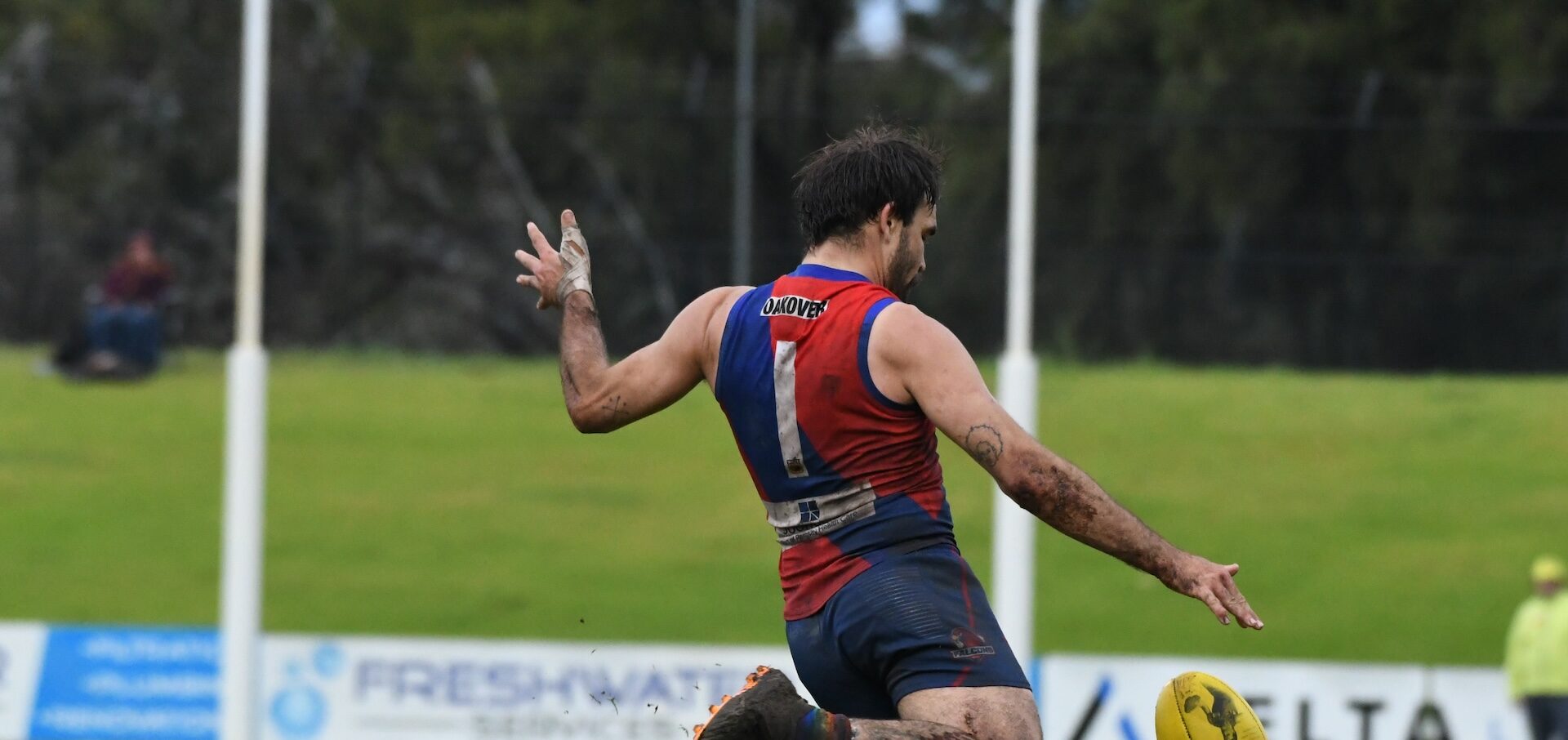
West Perth Football Club
Inaugural Hall of Fame Player Biographies
- Barney Grecian 1896 – 1900
- Herb Loel 1906 – 1907
- Jim Gosnell 1918 – 1919, 1921 – 1929
- Jim Craig 1918 – 1931
- Ted Flemming 1922 – 1938
- Don Marinko Snr 1926 – 1930, 1932 – 1939
- Ted Tyson 1930 – 1941, 1945
- Max Tetley 1931 – 1941
- Checker O’Keefe 1933 – 1941, 1945 – 1946
- Stan Heal 1939 – 1941, 1946 – 1953
- Fred Buttsworth 1942 – 1945, 1947 – 1953
- Wally Price 1942 – 1954
- Ray Schofield 1943, 1946 – 1958
- Ray Scott 1944, 1947 – 1955, 1959
- John Loughridge 1945 – 1950
- Brian Foley 1954 – 1965
- Brian France 1958 – 1967
- Mel Whinnen 1960 – 1977
- Bill Dempsey 1960 – 1976
- Graham Farmer 1968 – 1971
- Alan Watling 1969 – 1983
- Les Fong 1973 – 1987
- Peter Menaglio 1977 – 1989
- Paul Mifka 1984 – 1999
- Mark LeCras 2004 – 2008
- Alec Breckler 1930 -1935
- Roy Ennis 1933 – 1986
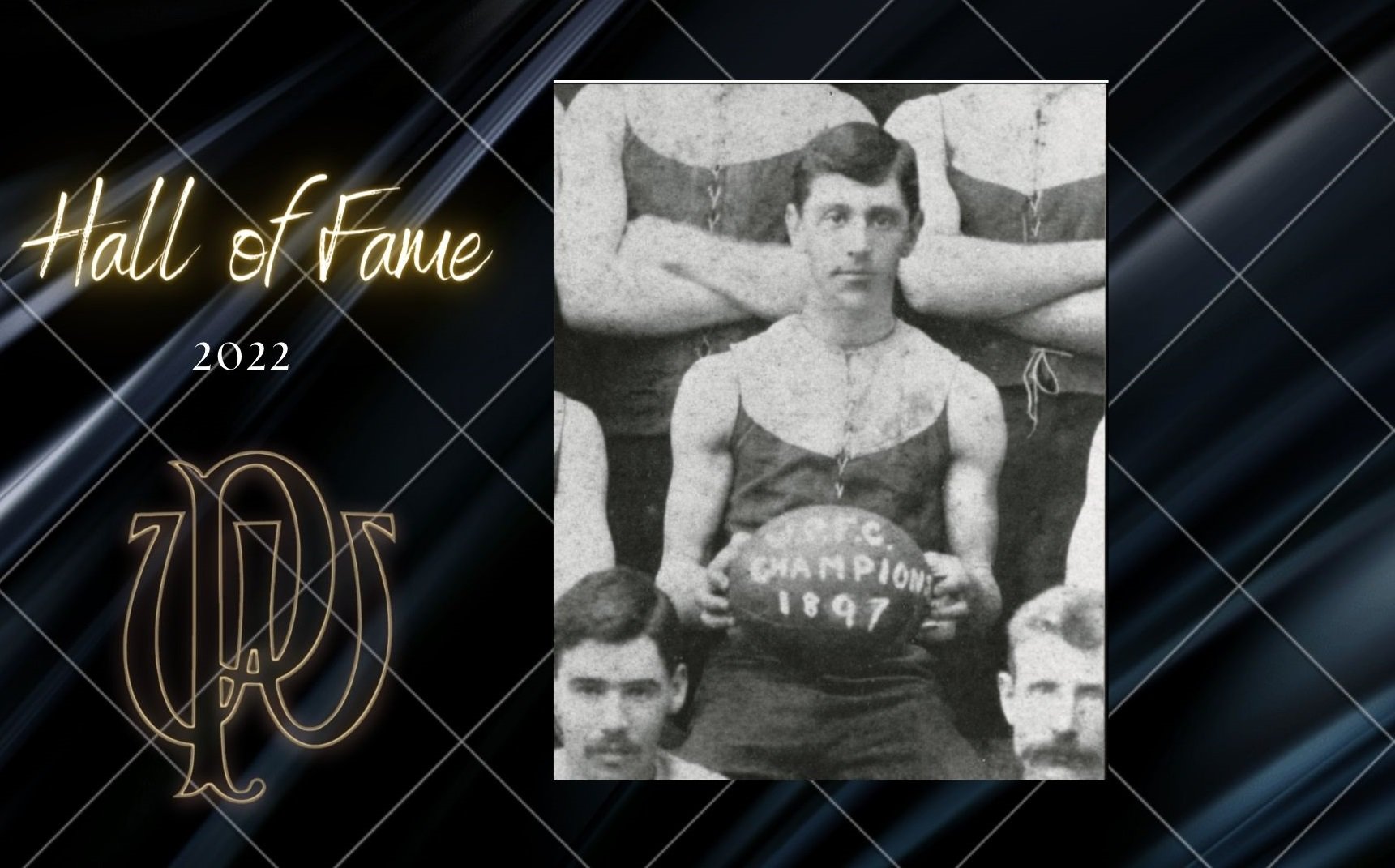
Barney Grecian
West Perth’s inaugural Hall of Fame inductee Barney Grecian will forever hold a special place in the rich history of the Falcons, being the first premiership captain in the club’s 1897 success.
Ernest Ferdinand “Barney” GRECIAN, born 18 November 1871, was already a champion footballer upon his arrival at West Perth for the 1896 season, having been a brilliant centreman and dual premiership player at Essendon, and an impressive junior at Geelong previously. Commencing his career as a half-back, he came under notice for his “wonderful dash, clean play and dodging with the ball”.
Like so many in this era, a flourishing WA economy, on the back of the gold boom, was one of the reasons to attract Grecian to Western Australia. A concerted and determined recruitment drive was another, given West Perth’s dismal 1895 season, winning only two games, finishing last, and generally performing ingloriously (they were held scoreless in one game and forfeited another).
West Perth’s performance in 1896, Grecian’s first, showed improvement in winning five games, although still finishing second last. However, the foundations for success had been laid.
Grecian’s influence on his new club really paid off in 1897, when as captain, he led West Perth through an unbeaten season (winning seven games and drawing five), resulting in the inaugural premiership success. This was followed-up by captaining another premiership in 1899 (losing only two games), the season being noteworthy for the club’s thrashing of the new team in the competition, Perth Football Club, in a game where gun West Perth forward and Hall of Fame inductee Herb Loel kicked a remarkable fourteen of the team’s fifteen goals.
Sadly, Barney Grecian fell ill during the 1900 season, forcing a premature end to his celebrated playing career. In five seasons at West Perth, Grecian played 65 games, and was twice premiership captain. In this time, his high profile helped put WA football on the map at a time when the game struggled for both a presence and relevance and was also instrumental in beginning West Perth’s emergence as a football powerhouse.
Barney Grecian relocated to the Coolgardie Post Office upon the conclusion of his career. Before finishing his football playing days, Grecian captained a WA representative team that took on a Goldfields side in a ‘test match’ held at Kalgoorlie reserve in August 1900. He was noted in a press preview of the game as having “few equals” in the centre position. His involvement in Australian Rules continued in his role of WA selector for interstate carnivals in 1908, 1911 and 1914.
Ill-health continues to plague Barney Grecian, and he passed away on 2 June 1919, aged only 47 years. Some publications erroneously recorded his age as 45 years. Reports of his funeral and obituaries were widely published. The attendance at his funeral, at Karrakatta Cemetery, reflected the esteem in which he was held. Pallbearers included legendary WA umpire Ivo Crapp. During the 1930s, Grecian’s brother-in-law, Tom Guthrie, was East Perth’s President, and was the subject of an interesting press report in 1934 where he was noted to be carrying Barney Grecian’s old cloth cap from his Essendon premiership days, at a football game, as a good-luck charm.
- WPFC 1896-1900
- 64 games, 3 goals.
- No interstate game played by WA during his career.
- Captain first WAFL combined team v Goldfields 1900
- Pre Sandover-Medal
- Pre club fairest and best
- WPFC premiership captain 1897, 1899.
- WA Football Hall of Fame (inaugural 2004)
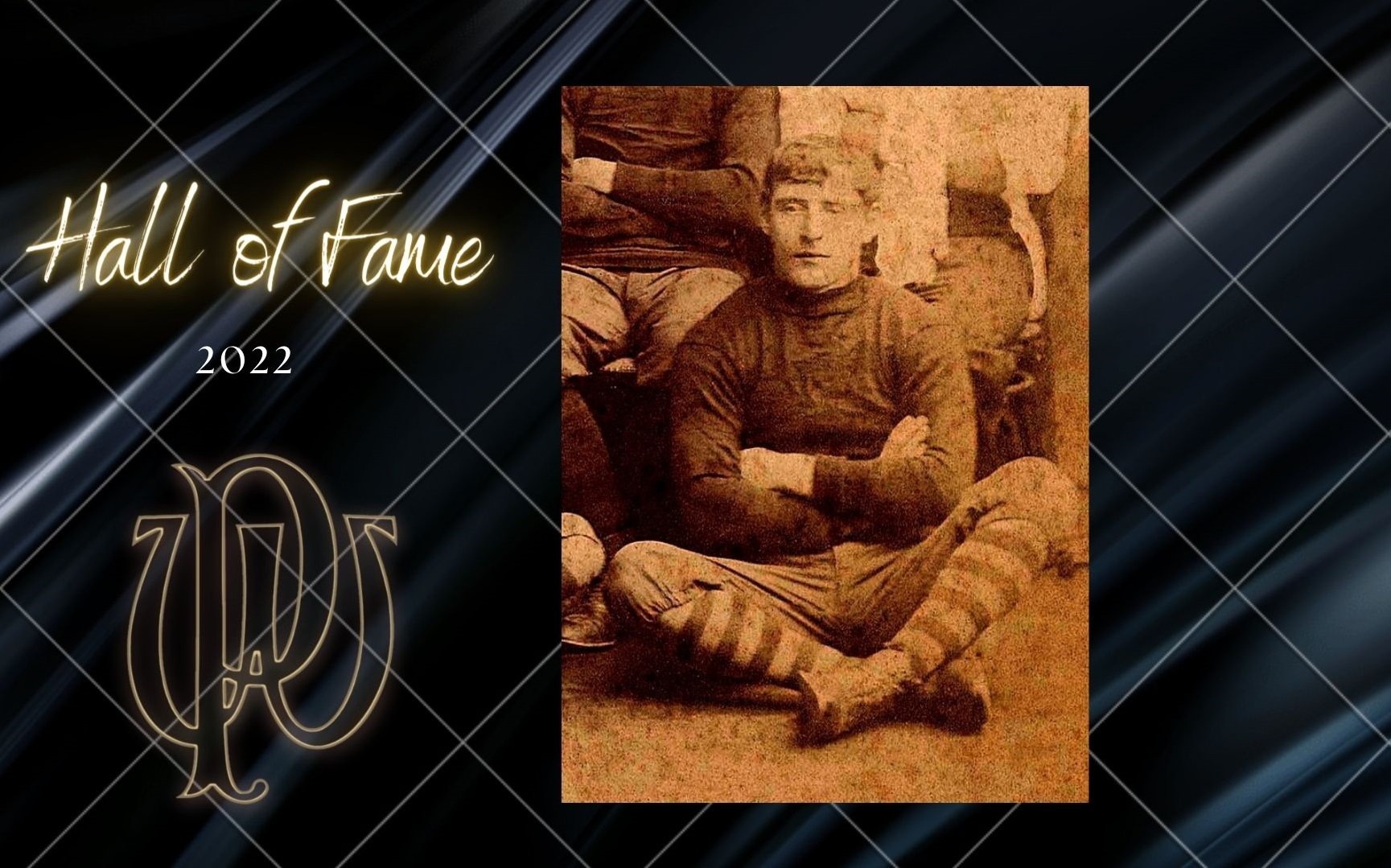
Herb Loel
West Perth’s inaugural Hall of Fame inductee was born on 2nd July 1876.
When the Victorians now West Perth were formed in 1885, Herbert Loel was 9 years old. The club became the Metropolitans in 1889 and then changed their name to West Perth in 1891. Herbert played his first game for West Perth in 1898 at the age of 22 years.
West Perth had won the Premiership in 1997 and were looking to repeat in 1998. West Perth lost to Fremantle on 30th July 1998, 4:7 to 4:6 by a point. This was the first year points were allowed to be counted and a goal was 6 points. This defeat cost West Perth the premiership who came 2nd ahead of Perth, Rovers and East Fremantle. However, they redeemed themselves in 1999 and won the premiership winning fourteen games and losing two. Herb Loel was the WAFA leading goalkicker with 50 goals for the season. On the 2nd September 1999, at the WACA ground, West Perth beat Perth 15:11 to 0:1, Herb Loel kicked 14 goals.
In 1901 two new clubs join the WAFA, Subiaco and North Fremantle, West Perth won the premiership finishing on top of the table at the end of the season.
In 1904 a finals system was introduced; Herb Loel and West Perth played a semi final against Perth and were defeated 7:5 to 4:9. The next year Herb Loel moved to play with the Perth Football Club.
Herb Loel retired after the 1907 season, playing 111 games and kicking 211 goals over 9 seasons. The journalist “D.H” reminiscing on earlier great players wrote this about Herb Loel.
Herb a glutton for work, standing up at all times to the severest of gruelling. He was an absolute champion at “leading out”, and one of the very best place kicks and running shots of any day. Altogether a superb half-forward. He was such a brilliant half-forward that brutal tactics were adopted at times to get him, but like all champion footballers he saw only the football. Loel never put his hand near a man, but he frequently received hard punches, and harder kicks.
- 111 games, 211 goals.
- No interstate games played during his career.
- Represented a combined WAFL team v Goldfields 1900, 1901
- Pre Sandover-Medal winner.
- Pre club Fairest and Best winner.
- WPFC premiership player 1899, 1901.
- WPFC leading goalkicker 1898, 1899, 1900, 1902.
- WAFL leading goalkicker 1898, 1899, 1900, 1902.
- WPFC captain 1902, 1903.
- WPFC Life Member.
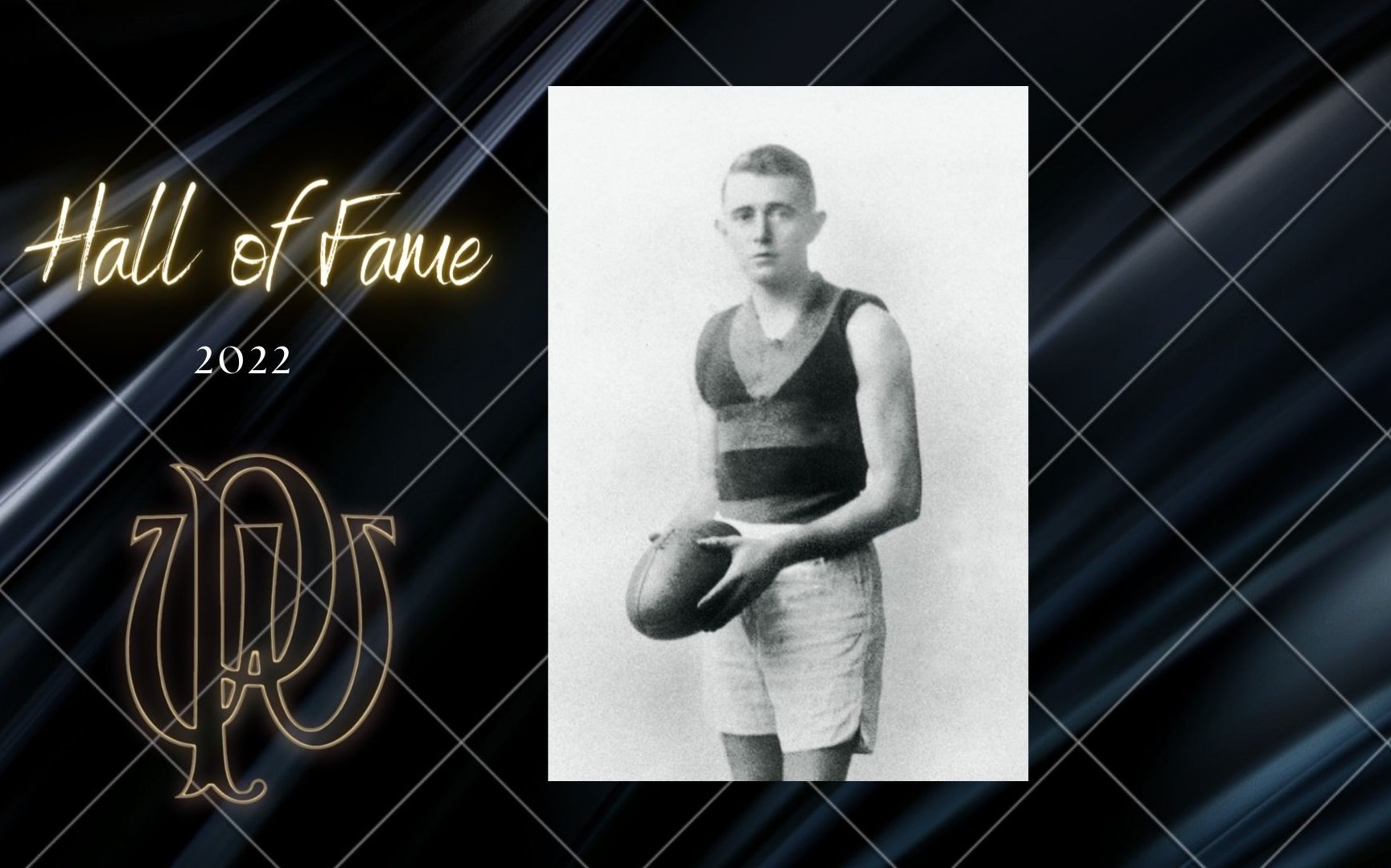
Jim Gosnell
Jim Gosnell was an inaugural Hall of Fame inductee at both West Perth and WA football league, which is testimony to an outstanding career as a superb defender and highly skilled footballer.
James Gosnell was born in North Fremantle on 7 July 1899. He began his career with West Perth in 1918, before heading to play with Railways FC in the Goldfields for the next two seasons, having been transferred by his employer- WA Government Railways.
By the time he returned to West Perth for the 1921 season, Gosnell had already established himself as a gun half-back and dual premiership player. At the Cardinals, he quickly became a mainstay in defence. Along with his cousin Jim Craig and Harold Boyd, the triumvirate became legendary as arguably the finest half-back line in Australian football, each winning a Sandover Medal in the 1920s. For Gosnell, this came in 1924 (he also was runner-up on two other occasions) and was followed by the Breckler Medal in 1927 the year that he sustained a significant arm injury. He served as club captain in 1928.
Known for his marking ability, pace and dash, and sure use of the ball, Gosnell frequently played upon, and eclipsed, the competition’s finest forwards. This is no better illustrated than in the article published in ‘The Call’ on 22 June 1928, that described his complete domination of Subiaco champion Johnny Leonard, handing the famous Subiaco goal kicker “one of best drubbings he’s had for a long time”.
Upon resuming from another injury in August 1929 against Subiaco, Gosnell played in the unfamiliar position of forward pocket. The Daily News report of his return noted that “he was not found wanting, and carried his task in promising style”, and further stated that “all present, must have realised that West Perth are fortunate in having a player of Gosnell’s class to come to their aid at this vital stage of the season”.
Jim Gosnell represented WA on fifteen occasions. This should have been more if not for a dislocated elbow suffered in July 1927 playing against Perth. He was best afield until sustaining the injury and ruled him out of almost certain state representation selection for the carnival in Melbourne that year. While this was the case, West Perth covered his fare and sent Gosnell for the trip anyway, reflecting his stature and standing in the game.
On these many trips, Jim Gosnell no doubt put his sharp card playing skills to good use. Certainly, his cousin and close teammate Jim Craig was on the receiving end on more than one occasion, having been relieved of his hard-earned money during several long card game sessions!Retiring from West Perth at the end of the 1930 season, Jim Gosnell returned to the Railways FC on the Goldfields for another two seasons. He continued to play brilliantly, winning the Dillon Medal as the competition’s fairest and best.
Later, Gosnell turned his hand to coaching, with a stint as reserves coach at Claremont in the mid- 1930s. As it seems with many champion footballers, Jim Gosnell showed prowess in other sports, being a very talented cricketer and yachtsman.
- 122 games. 39 goals.
- 14 state games.
- Sandover Medal winner 1924 (+ RU 1926)
- WPFC Fairest and Best 1927
- PWPFC captain 1928.
- WA Football Hall of Fame inductee (2007).
- WPFC Team of the Century (interchange).
- WPFC Life Member.
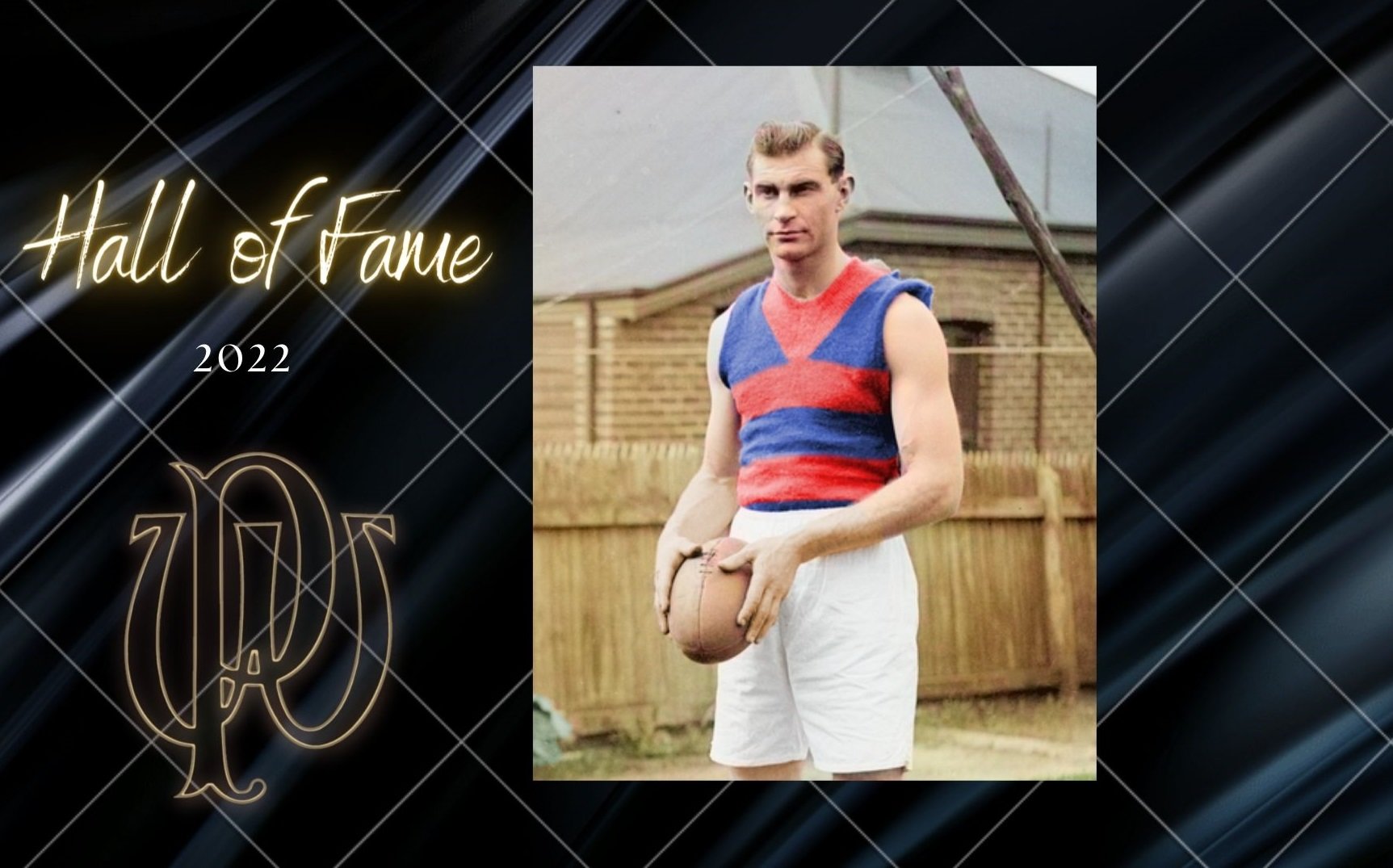
Jim Craig
Jim Craig, West Perth’s third Sandover Medallist (1927), was renowned as a rugged and fearless defender for opponents to get past in his celebrated career. Jim earned the nickname, ‘The Rock of Gibraltar’. He endured tough games on the footy field, which also mirrored his hard circumstances in his early life.
Jim Craig’s daughter, Mrs Maureen Jarvis, recalled that her Dad, a fitter by trade, lost his own Mum, Grace, when he was aged 17, eventually living with his cousin, Jim Gosnell, West Perth’s 1927 Sandover Medallist. After losing his job at the time when the worsening economy was about to bite, far harder around the world, Jim had to find work where opportunities allowed. One such job was helping with building a new fence at Leederville football oval.
Jim Craig started playing in 1918 and amassed 203 games over 14 years at West Perth. Jim earned a reputation as one of the era’s finest centre-half backs. He represented WA in state football an impressive 18 times, this took Jim to the many places, such as Hobart and Melbourne. Jim played in the Australian National Carnival in Hobart in 1924. He was one of five West Perth players with Jim playing in the famous half back line of Boyd, Craig, and Gosnell. Maureen recalled her dad saying the harder Victorian surfaces caused soreness and plenty of ‘corkies’. Of interest also was her reminisce that Jim ruefully confided that he and some teammates were relieved of their money playing cards during a trip away, by of all people, teammate, and Cousin Jim Gosnell- a card shark, as Jim Craig described!
Maureen recounted a fascinating story about her dad. He never owned a car, preferring to ride a bike, or catch the train for work. Amazingly, this is how he found out about becoming a Sandover Medallist in 1927, when on the morning train, a fellow passenger inquired “hey Jim, do you know you won the Sandover last night?” How times have changed! When talking about her dad’s time in the game, Maureen explained that boils were a constant irritation to Jim. He described to her that there were no showers in his day; instead, players cleaned off in big communal tubs of water. The heavy woollen guernseys worn in the era, combined with the clearly dubious hygiene of shared baths, caused Jim a problem or two in dealing with boils that developed on his body in these conditions.
Jim became the third captain selected in 1928 after Bill McRae and Harold Boyd stepped down. Jim retired in the pre-season of 1931 but came back and played later in the season. Upon retiring, Jim Craig stayed in touch with his beloved West Perth and footy in general, being a trainer at the Cardies for several years upon his retirement in 1931. When the Sandover Medal count changed to the occasion that we now know, Jim loved the night and attended regularly over the years, looking forward to the catch-up with old mates. Mrs Jarvis noted that the count in those days was strictly a men’s night, but as times and attitudes changes, wives could be invited. She remembers fondly the night she accompanied her Dad; this being after the passing of her Mum, Jim’s wife, Nellie. Maureen Jarvis would have been right at home amongst the footy banter of that evening. Maureen’ husband, Lyle Jarvis, was the nephew of East Fremantle champion Carlisle (Bub) Jarvis, their 1934 Lynn Medallist, six-time premiership player and eight-time state representative.
Jim Craig was wonderfully sure in the air and with his long kicks he transferred play time and time again. His was an exhibition that could hardly be faulted.
- Jim Craig Years: 1918-1931 Number: 4
- WPFC games played: 203
- State games played: 18
- Sandover Medal: 1927 (7 votes)
- WPFC Captain: 1928, 1930
- WPFC Team of the Century: 2000
- WA Football Hall of Fame Inductee: 2005
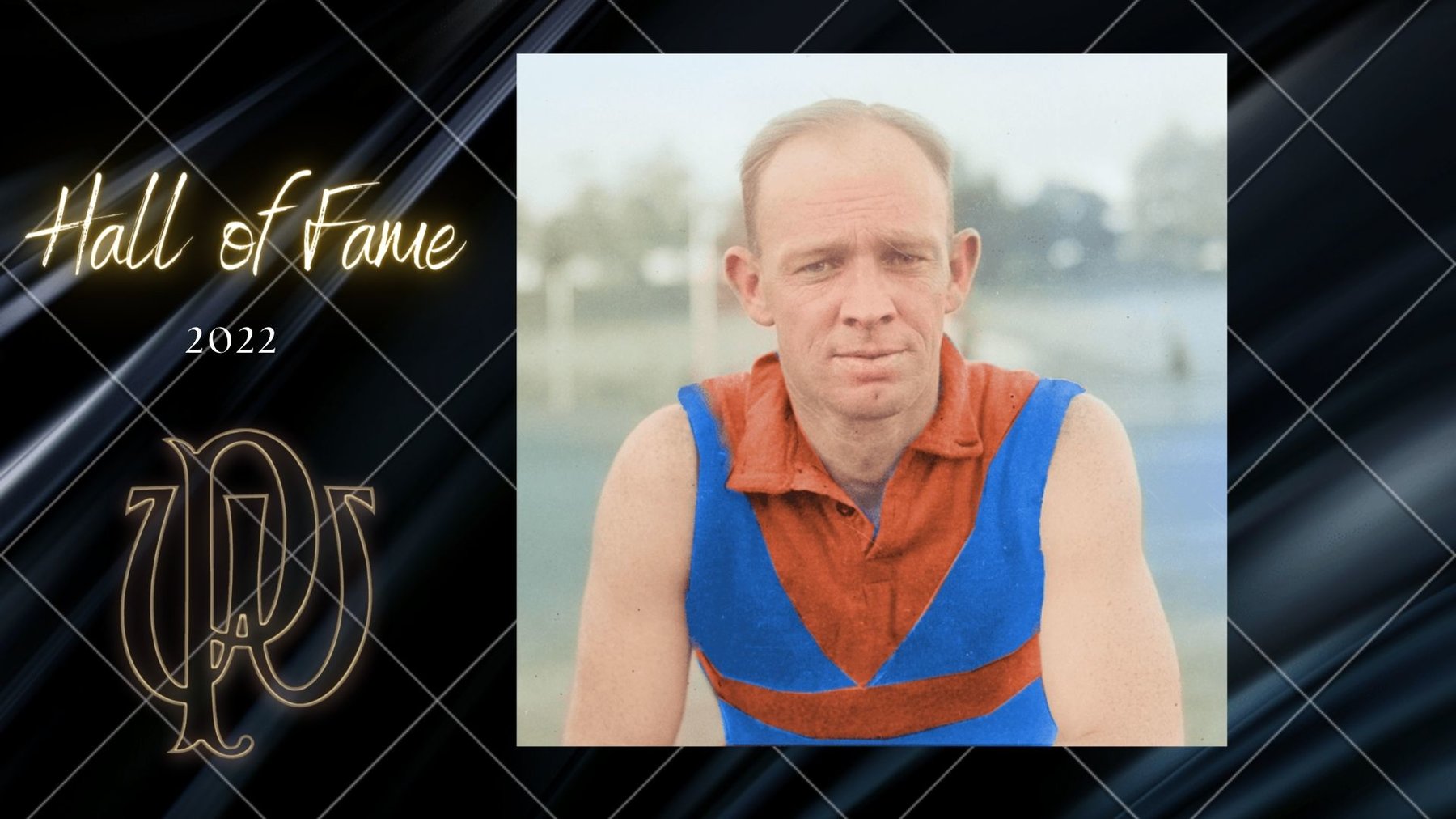
Ted Flemming
Edward Flemming (Ted) was inducted into the West Perth Football Club Hall of fame in 2022. If awards were given for versatility, surely Ted Flemming would be a clear winner. In 1925, Flemming won the league’s leading goal-kicker with 50 goals, yet in 1930, won the Sandover Medal as a “high flying” half-back.
Edward Joseph Flemming was born on 30 October 1902 in Boulder, and took up the game upon moving to Westonia, in the eastern wheatbelt, playing in the centre. Later, after moving again, this time to Perth, he played firstly with Maylands in the WA Football Association for two seasons, before switching to Highgate for a further three. Both clubs were East Perth heartland, but Flemming’s destiny was sealed when in playing a game for the State Taxation Department, he came under notice of two interested on-lookers; West Perth’s propertyman Bill Webster, and legendary WA umpire and later West Perth FC life member, Henry (Ivo) Crapp. Flemming snapped up the offer of a Cardinals try-out.
Joining in 1922, Flemming commenced as a half-forward. The Cardinals’ famous Sandover Medal-winning triumvirate of Harold Boyd, Jim Gosnell and Jim Craig were already well entrenched across the half-back line, so when Flemming was initially called into action to help in defence, it was in the back pocket. However, in 1925, when West Perth were short of a full forward, it was Flemming that answered the call, and proved so effective and flexible that the 50 goals he kicked was enough to be the league’s leading goal kicker. His move forward was never permanent, as such was his skill and value to the team as a defender, he often started a game down back, and then moved up the ground if the Cardinals forward line was struggling.
In the next several seasons as players retired, Flemming became established as a renowned centre-half back. His first of two West Perth fairest and best awards was bestowed in 1928. Two years later, at aged 27, Ted Flemming became the Cardinals’ fourth Sandover Medal winner, by polling 23 votes, 5 ahead of the dual runners-up (this was the first year of 3-2-1 voting by the umpires). The Sunday Times’ coverage on 28 September 1930 of the result lauded Flemming’s win, noting the “decision will be well received, as Flemming’s task was made formidable by the indifferent showing of his teammates and the few successes gained by the side were largely due to the strenuous efforts of the high-flying half-back”. Interestingly, Flemming did not win West Perth’s fairest and best award in his Sandover Medal year.
Ted Flemming’s stature as a superb backman continued to grow. He was again well regarded for the 1932 Sandover Medal. The Sporting Globe’s preview of 7 September 1932 talked-up Flemming’s chances, stating he has “been in League football for eleven seasons, and is still playing brilliant football. During his League period he has been outstanding as an aerialist, and his freak marking has never been surpassed”. Flemming polled well, with 15 votes, to finish third, with Claremont-Cottesloe’s Keith Hough a runaway winner on 32 votes (Hough was one of the dual runners-up to Flemming in 1930). Season 1932 finished on a high for Flemming and the Cardinals, winning their first premiership in 27 years, with an 18.9 to 11.8 thumping over East Perth in the Grand Final.
This commenced a golden run for Ted Flemming and the club. Two years later, in easily defeating East Fremantle 11.7 to 5.9 for the 1934 flag, The West Australian’s review on 15 October said that “West Perth’s high marking was brilliant, men like O’Keefe, Flemming and McDiarmid seldom missing”. The Cardinals went back-to-back in 1935, beating Subiaco 11.8 to 7.9; once again, Flemming stood tall in defence.
Another personal accolade followed, with a second fairest and best award in 1936.
Flemming’s breathtaking high-marking and leaping had the press speculating that he had been fortunate not to be injured; “there is none to live with him in the air, his leaping being remarkable, and it is ever a matter of wonder that he has not been seriously injured, for he jumps well above the pack with reckless abandon, and comes down with some great crashes”, published in 1932’s The Daily News, is an example. It is worthwhile to note that in his Sandover Medal year, Flemming was hospitalised with concussion in June due to a heavy knock, while in 1937, at Fremantle Oval, his right leg was broken below the knee.
Ted Flemming retired at the conclusion of 1937, after sixteen stellar seasons. It is a tribute to his standing at the club that he was named captain in this final season, in addition to also leading the club in 1931. Later, Flemming served in the RAAF during World War II based in Eastern Victoria and later worked at Essendon Aerodrome in the early 1960s.
- 1922-1937
- 227 club games, 19 WA games
- Sandover Medal 1930
- Fairest and Best 1928, 1936
- Club Captain 1931, 1937
- Premierships 1932, 1934, 1935
- WA Football Hall of Fame 2007
- West Perth FC Hall of Fame 2022
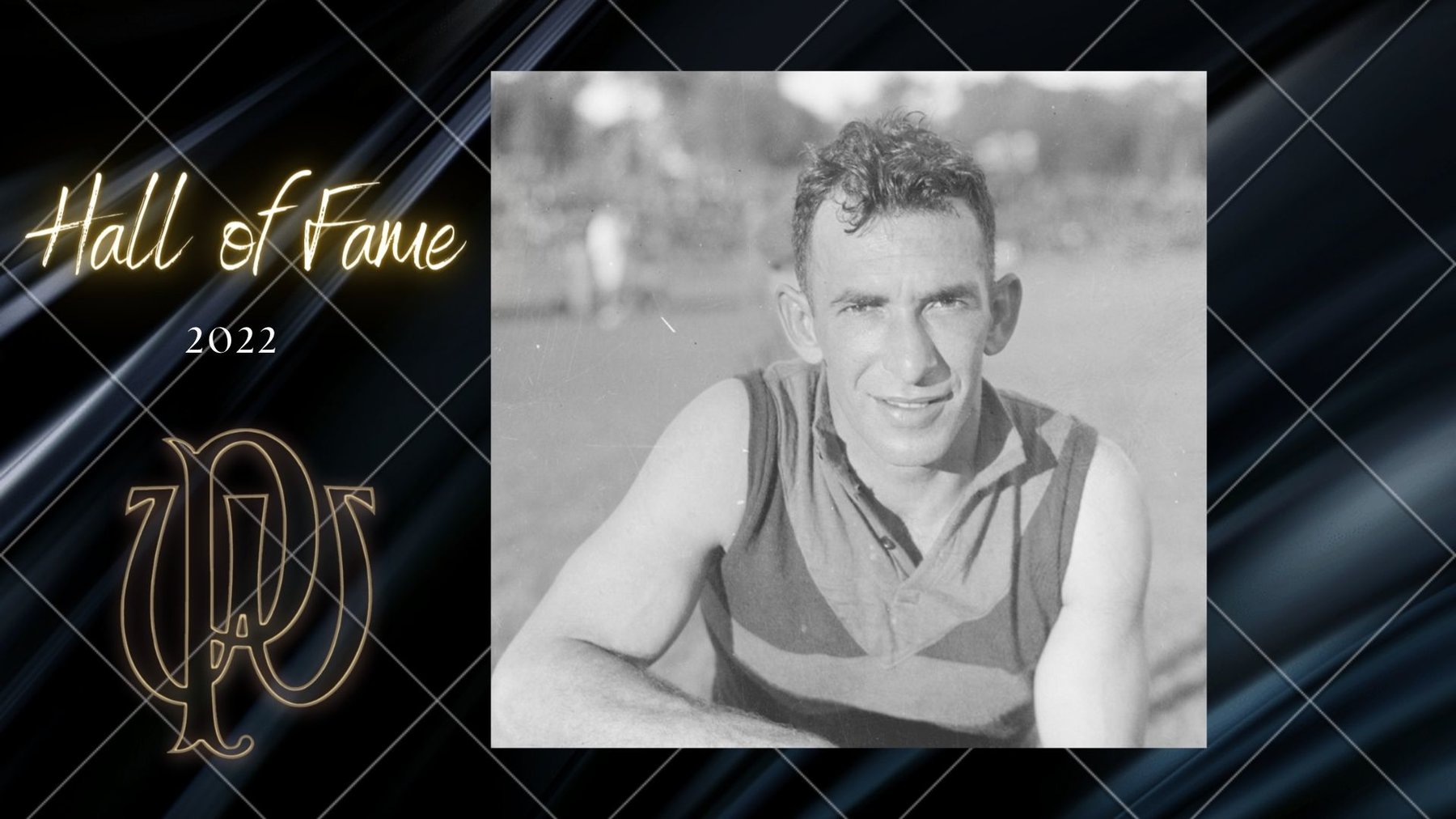
Don Marinko Snr
Don Marinko was born on the Golden Mile at Kamballie on 27th August 1907. Don learnt the game of football at the Christian Brothers College in Perth. As a strapping 1.8 m (5ft 11in.) schoolboy he attracted the attention of Subiaco and made his league debut on 23rd June 1923 before turning 16. Starting in a forward pocket, he made a favourable impression, with The West Australian reporting that “a word of praise should be given to young Marinko who signalised his debut in league football with a fine mark and a good kick for a goal”.
After two further appearances that season, he returned to the Goldfields to work underground on the Golden Mile and joined the Boulder City Football Club. He played in the 1924 and 1925 premierships and developed a significant reputation before being tempted into a second stint in league football.
Several clubs sought his services, but after arranging to play for East Perth it was found that he was residentially bound to West, having inadvertently taken up residence in Osborne Park. East Perth’s loss was West Perth’s wonderful gain for in the subsequent 13 seasons he became a brilliant ruckman/forward and a key component of three premiership teams including two as captain.
Don Marinko married and had two sons, Donald Anthony and Raymond George Marinko, both played WAFL football for West Perth in the 1950s. With Don being named Don Junior then when Don Jnr start playing for West Perth in 1952. Then, Don became Don senior. Don Marinko Jnr played 196 games for East Perth, West Perth, where Ray played 184 games for East Perth and West Perth.
Marinko’s greatest assets were his pace and agility for a big man and his brilliant left-foot stab passing which was used to great effect in partnership with champion full-forward Ted Tyson. After Marinko’s death, Tyson credited about 500 of his 1197 goals to “Big Don”. “He was one of the best stab passes I’ve seen and hit his target 90% of the time. He had the ability to put perfect weight into his kick, either booting it hard when I was on a fast lead or softly when I managed to break clear on my own”. Contemporary newspaper accounts were equally eulogistic over a long period with the examples following:
“Marinko is in wonderful form at present and is probably the best player in League ranks. He has dash, turns cleverly, possesses a sure pair of hands, and utilizes both the half distance pass and the long drop kick to advantage. His work in the ruck was superb and when placed in defence his value never diminished.” Westralian Worker 13 September 1929
“Right out on his own was Marinko of West in the game at Leederville. His ruck work was of a very high standard, his marking very sure and spectacular and his passing of the ball ’a thing of beauty and joy forever’. He is a champion and his selection as a Carnavalian simply a matter of course “WA Footballer” 15 July 1933
Marinko maintained a very high standard of play over a long career and represented Western Australia 13 times between 1928 and 1936 often being among the best. After retirement in 1939 he was proud to see his two sons Don and Ray enjoy long careers in League football before their father passed away from a sudden heart attack in 1967.
Selected on the half-forward line in West Perth’s “Team of the Century” in 2000, Don Marinko Snr was one of West Perth’s most influential players in a golden era. His style was equally as attractive as it was effective, and he becomes a very worthy member of the WA Football Hall of Fame.
Among the many champion footballers to emerge from the Goldfields, by no means the least is West Perth champion ruckman and half-forward Don Marinko Snr, who in a 17-year career established a reputation as not only one of the greatest players of his era, but also one of the most stylish to behold.
Marinko died in 1967 from a heart attack. He was named in West Perth’s Team of the Century in October 2000, and was inducted into the West Australian Football Hall of Fame in March 2011.
Don MARINKO Snr
- WPFC 1926-1930, 1932-1939
- 194 games
- 98 goals
- Sandover Medal 1930
- 13 state games
- 39 career Sandover Medal votes (1930-39, 3-2-1)
- WPFC Fairest and Best 1933
- WPFC premiership player 1932, 1934 (captain), 1935 (captain)
- WPFC captain 1934, 1935
- WA Football Hall of Fame inductee (2011)
- WPFC Team of the Century (HFF)
- WPFC Life Member
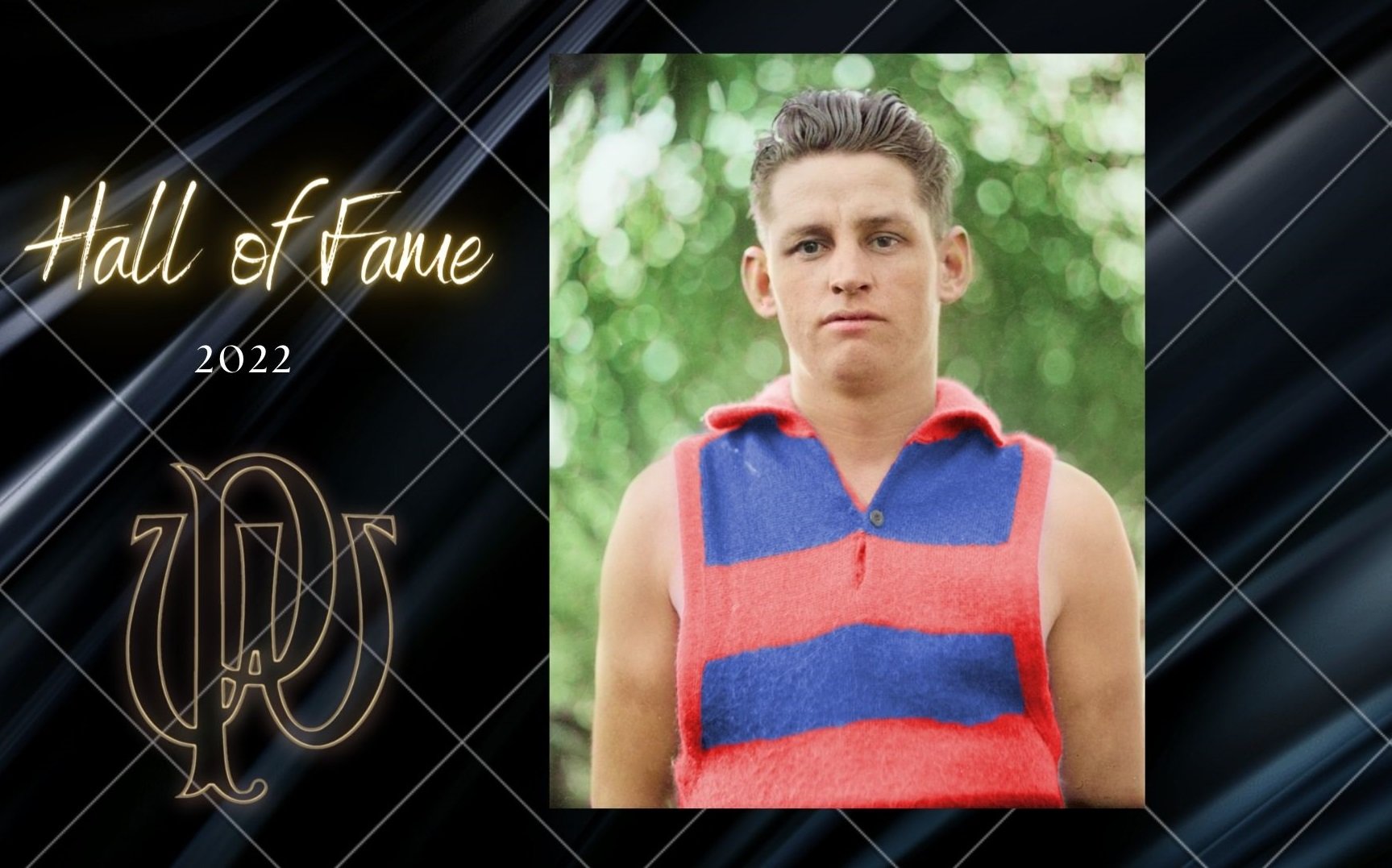
Ted Tyson
EDWARD (TED) ARTHUR TYSON, Ted Tyson was born in Kalgoorlie on 4th February 1910 and died in Hamersley on 5th February 1996.
Ted was born into a talented football family. His father – Sam Tyson – played 60 games for West Perth (1921- 1925, & 1927). His uncle – Tony Tyson – played 108 games for Perth (1913 – 1919) and 55 games for West Perth (1920 – 1924) and kicked 22 goals. Ted’s cousin Charlie Tyson Jnr played 106 games for Collingwood and 38 games for North Melbourne. His uncle Charlie Tyson Snr played 17 games for East Fremantle. Ted’s brother in- law was well known state cricketer Laurie Bandy.
Ted was only 177 centimetres tall and a right footer, but very adept with his left. He debuted in 1930 kicking over 50 goals in his first year. Ted was West Perth’s leading goal kicker from 1931 until 1941. He kicked a career total of 1196 in 228 games at West Perth averaging over 5 goals a game, and was only goalless in 3 games.
In 1931 Ted kicked 81 goals and in 1932 booted 96 goals including 8 in the Grand Final. He kicked over a 100 goals 4 times and played in 4 winning Grand Finals (1932, 1934, 1935 & 1941). In 1940 Ted kicked 60 goals before his season ended with appendicitis. Ted returned in 1942 but retired due to WW2. He was the leading goalkicker in 1938 with 126 goals which was remarkable as West Perth had fallen to last on the ladder. The last game of that year was remembered because Ted kicked 17.5 in a losing team total of 18.7. This is still the most goals kicked by an individual in a losing side in senior Australian Rules.
Ted played 4 interstate matches in 1933, kicking 13 goals and was often overlooked for East Fremantle’s George Doig who was also a prolific goal scorer at that time.
Ted is the full forward in West Perth’s team of the century 1900 – 2000. He was inducted into the WA Football Hall of Fame in 2004. In 2022 Ted was an inaugural member of the Australian Hall of Fame. Ted had a remarkable career and was the leading WAFL goal kicker until taken over by Austen Robertson Jnr.
- WPFC 1930-1941, 1945
- 228 games
- 1197 goals
- 19 career Sandover Medal votes
- Australian Football Hall of Fame inductee (2022)
- WPFC premiership player 1932,1934,1935,1941
- WPFC leading goalkicker 1931-1941 (11 seasons)
- WAFL leading goalkicker 1932, 1938
- WA Football Hall of Fame inductee (2004)
- WPFC Team of the Century (full-forward)
- WPFC Life Member
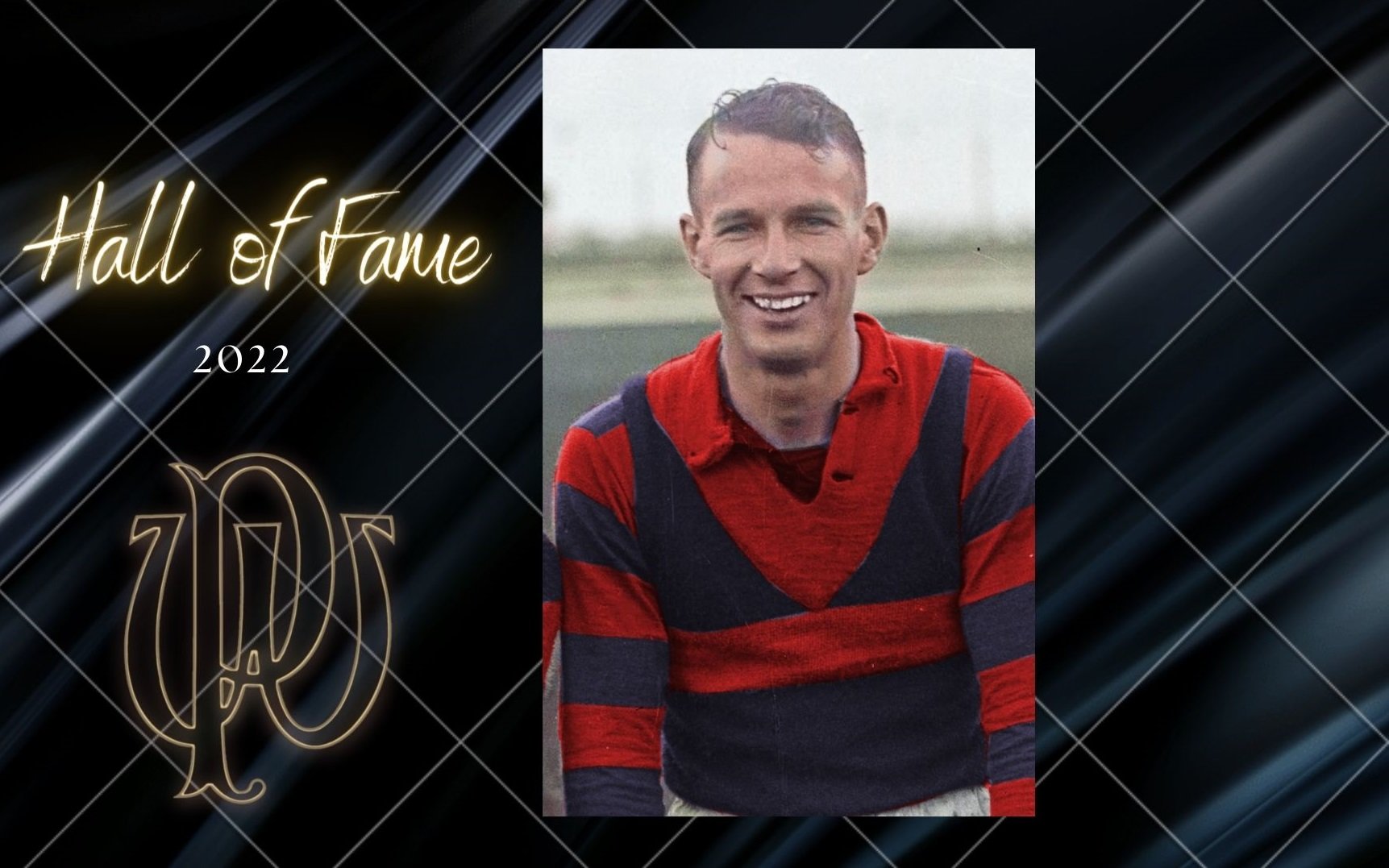
Max Tetley
Maxwell Joseph Tetley was born in Fremantle on 22nd April 1909, and played his early football for North Fremantle in the suburban competition. He came under notice by officials from the East Fremantle Football Club and was invited to their training sessions, and in 1930 played for them in a challenge match in Kalgoorlie against the Goldfields Football League.
However, in 1931 Max began employment with Betts & Betts shoe store in Hay Street, Perth. The store was opened in 1912 by the Breckler family and became the largest shoe store in the country. Owner, Alec Breckler, was elected to the Presidency of the West Perth Football Club in 1930 and he was to have a significant influence on Max’s football career when he arranged to have him cleared from East Fremantle to the Cardinals.
This was indeed a coup, as Max was a ready-made footballer who lived up to all expectations by winning the trophy for the best first year player. To that time West Perth hadn’t won a premiership since 1905, and were left without success for 26 years, which stands as the longest in the club’s history, but all that changed in 1932.
With Max playing at full-back, and an influx of new players, together with distinguished Victorian Jack Cashman being appointed as coach in 1930, the Cardinals finished second on the ladder and went on to beat East Fremantle in the second semi-final by 18 points after being 19 points in arrears at three quarter time. In the grand final against East Perth, Max lined up on Mick Cronin, and after such a long premiership drought the Cardinals were in no mood to lose, running out winners by 43 points after kicking 6.2 in the final quarter, along with Ted Tyson’s 8 goals for the match. It would be 2002 before cross town rivals East Perth won a grand final against West Perth.
The success didn’t stop there for Max, he won the 1932 Breckler Medal, and held down the key positions at centre-half-back and full-back in the premierships in 1934, 1935, and later in 1941. He represented Western Australia 14 times and captained the state team 4 times and coached the state team. He was a strong defender, a long kick, and moved with style, and was an integral part of the club’s successes over that period.
Max coached the Cardinals in 1938 and 1939, but due to a run of crippling injuries and many key player losses it wasn’t a great period for the club, only winning four games in those two years. He continued to play in 1940 under newly appointed coach Ross Hutchinson, and in 1941 considered retiring, but stayed on as full-back to help rebuild the team, and they went on to win an amazing grand final in which few expected them to succeed.
During the WWII years Max was forced to retire because of the decision in 1942 to change the league into an under eighteen competition. Many players had enlisted in the armed services, and he didn’t return to football after the war, therefore after 210 games and eleven seasons with the Cardinals his remarkable career had come to an end.
Max passed away on 9th February 1997 at age 87 and will be remembered as one of the great legends of West Perth Football Club and Australian Football, and testimony to that fact is his career statistics below.
- 210 games for West Perth
- 11 seasons (1931-1941)
- Premiership player 1932, 1934, 1935, 1941
- Breckler Medallist 1932
- Best First Year player 1931
- West Perth Captain/Coach (1938-1939)
- West Perth Captain (1940)
- State Representations – 14
- State Captain – 4 times
- Western Australian Football Hall of Fame (inaugural member)
- West Perth Team of the Century
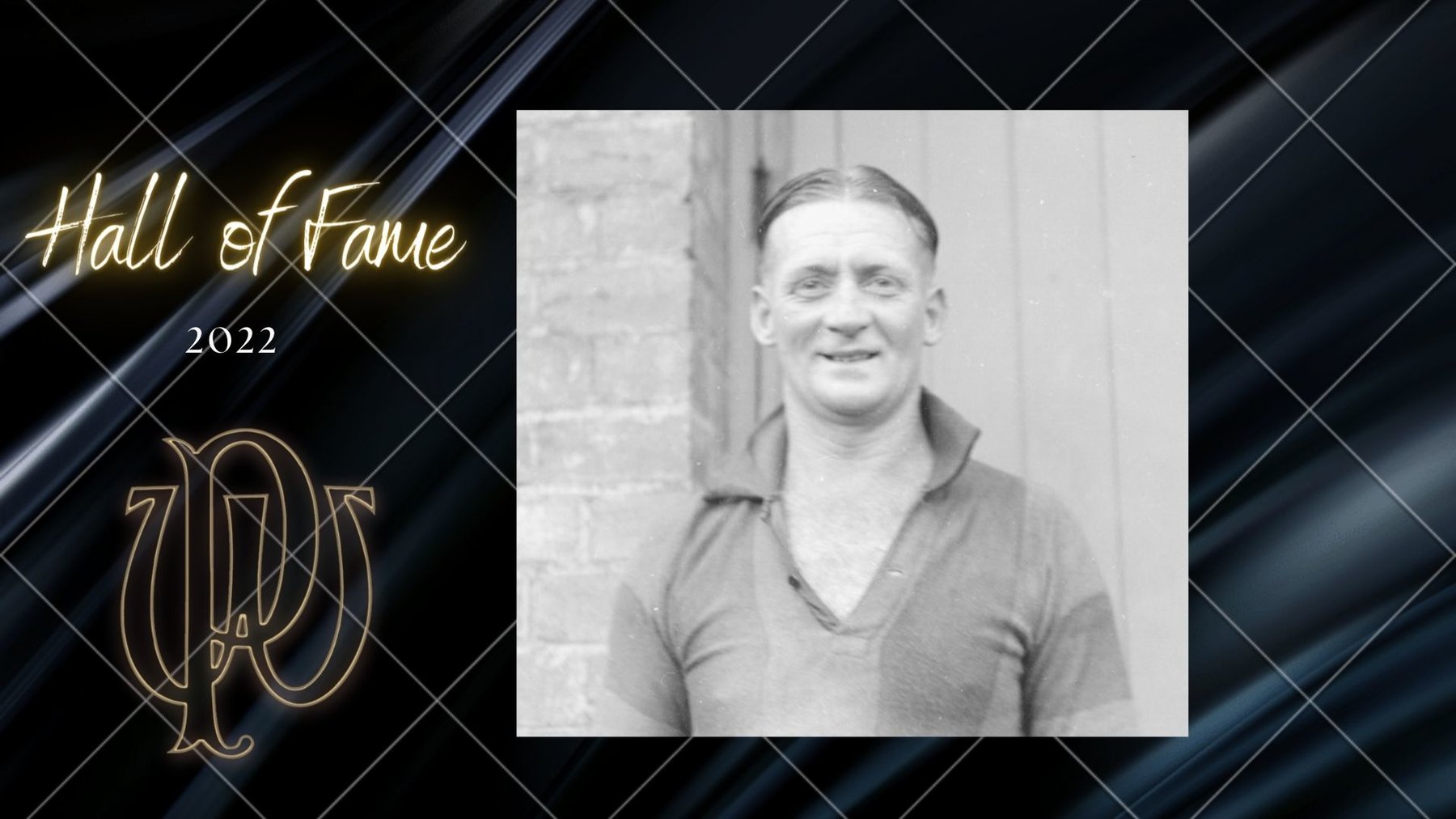
Checker O’Keefe
Terrence Bernard ‘Ed’ O’Keefe was born in Boulder on 14 May 1913.
He was also known by his nickname Checker and it’s still unknown where the name originated from. His family knew him as “Uncle Ted” of which is obviously short for Terrence.
O’Keefe played his junior football as a defender with the Mt Hawthorn amateurs and represented the state.
In 1933 he commenced playing for West Perth.
O’Keefe’s sister Eileen was married to Lal Mosey a member of the Swan Districts inaugural 1934 team. Both O’Keefe and Mosey wore the #3 guernsey for most of their playing careers.
O’Keefe was a member of West Perth’s 1934, 1935 and 1941 premiership sides. A versatile footballer that could play in both the ruck, and across half back. He was originally a half back until coach Johnny Leonard made a tactical move one Saturday when the team was struggling. The move paid off and he became the No. 1 ruckman.
In 1940 O’Keefe at the age of 27 won the Sandover Medal with 29 votes to beat his teammate Stan Pops Heal by four votes. Mosey jokingly claims that he helped O’Keefe win the medal. O’Keefe admitted that Heal, will be his main opponent on medal night. “As it turned out Swans were playing West Perth in that final game and Mosey played on Pops and didn’t give him a kick.”
O’Keefe also won four Fairest and best awards for West Perth, with them coming in consecutive seasons from 1938 to 1941. During his career he represented Western Australia in six interstate matches.
He enlisted in the army July 5, 1942, and discharged on November 21, 1945, with the rank of private. He returned to playing for West Perth to 1946.
Over O’Keefe’s working career he was an apprentice baker and drove the delivery truck for the brewery.
After football his nephew Bob recalls Checker had a horse in the backyard of his residence in Victoria Street. He also lived in Cunderdin. He lived the remainder of his life upstairs at the Rosemount Hotel where he passed away on Christmas Eve 1986.
In 2000 Checker was named in the ruck for West Perth’s official ‘Team of the Century’.
Checker was a kind and well-dressed, politically correct widower.“O’Keefe and his likeable grin will remain a fond memory amongst Cardinal supporters.
- 194 games
- 91 goals
- 5 state games
- 87 career Sandover Medal votes
- Sandover Medal winner 1940 (5th in 1938)
- WPFC Fairest and Best 1938, 1939, 1940, 1941
- WPFC premiership player 1934, 1935, 1941
- WPFC Team of the Century (ruck-rover)
- WPFC Life Member
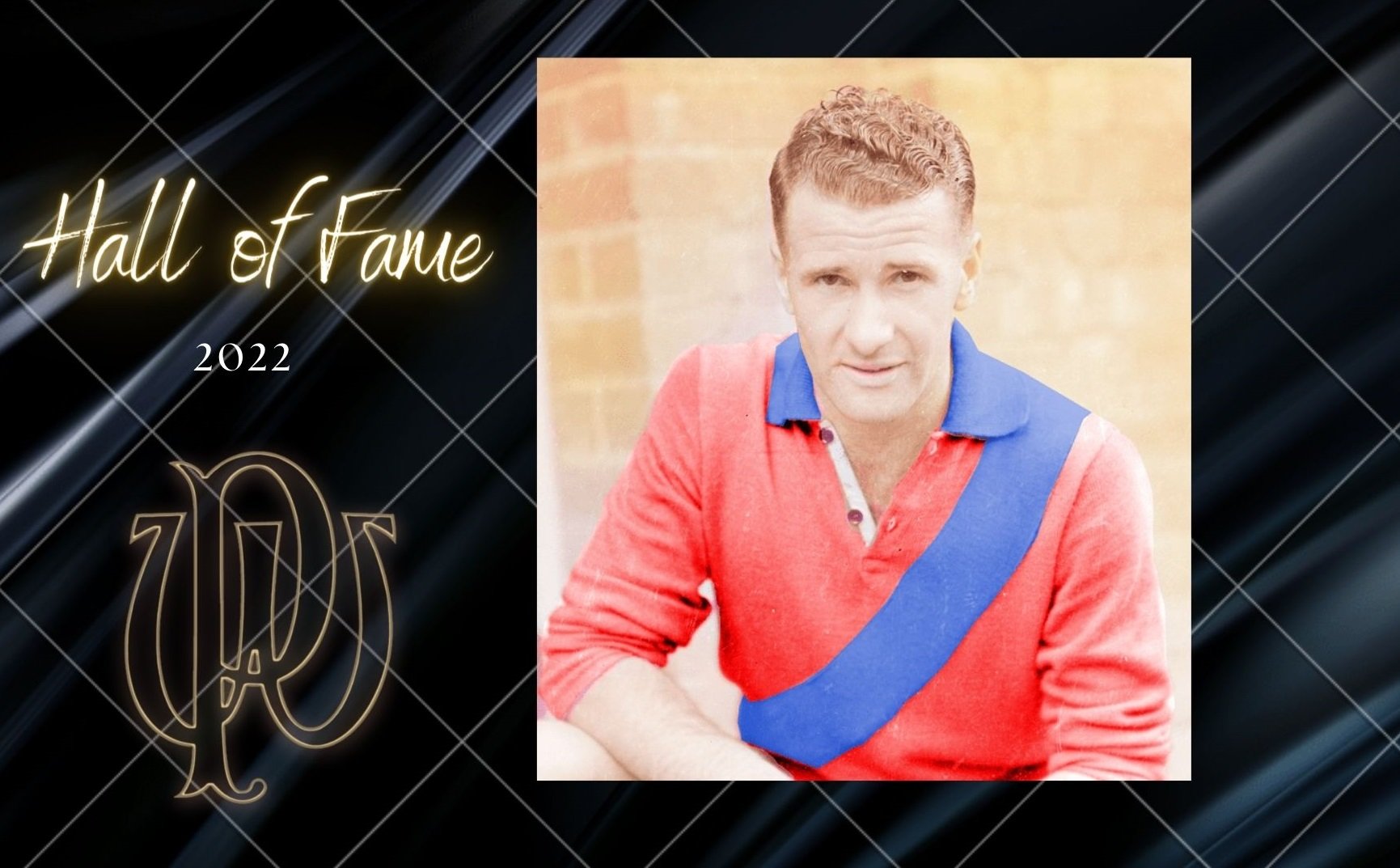
Stan ‘POPS’ Heal
Stan “Pops” Heal, was a great sportsman and a Politician. Born 30th July 1920, lived in Subiaco then moved to Kalgoorlie in 1932 with the family. Stan Heal was called “Pops” by his father at an early age and from then on, was always known as “Pops.”
Pops played junior football with Mt Hawthorn Mets and was recruited to West Perth in 1939. The Heals have grown a dynasty of footballers. Pops played 8 games with Melbourne and his older brother Jack played three games with Melbourne in 1942. Pops had three sons who all played in the WAFL – Graham (122 games), Stephen (136 games) and Laurie (154 games). Graham played in five losing games for North Melbourne in 1968.
Pacy, courageous and highly skilled, Stan ‘Pops’ Heal was one of Australia’s finest wingmen of the 1940s. His WANFL career with West Perth comprised 180 games between 1939 and 1953, with a break for the war.
The West Perth teams of the half decade or so following World War II were among the finest in the club’s history, and Pops Heal was very much a lynchpin, both as player and coach. He played in three premiership sides for the Cardinals and won their fairest and best award in 1947. He coached the victorious Grand Final teams of 1949 against Perth and 1951 against South Fremantle.
Heal joined the navy in 1941 and was stationed in Fremantle until July and was able to get weekends off, to play for West Perth.
STAN “Pops” Heal will be remembered for his unique feat in 1941, when he played in two premiership teams in different states as a 21-year-old. Whilst temporarily stationed in Victoria, Pops lined up with Melbourne, and played on the wing, as the Redleg’s defeated Essendon in the 1941 VFL Grand Final. He then travelled back to Perth by train, after the Melbourne premiership, arriving in time to play in the WANFL Grand Final with West Perth. West Perth beat East Fremantle 14.14:98 to 10.17:77, completing the second half of a remarkable double premiership in the one year.
Heal played 180 games for West Perth between 1939 and 1953, he coached the then Cardinals for 6 years, from 1947 to 1952, which remained the club’s longest coaching term until Bill Monaghan completed 10 years in 2018. Pops coached West Perth to two premierships in 1949 and 1951.
He was beaten in the Grand Final by South Fremantle in 1947, 1948 and 1952, and by Perth in preliminary final in 1950. Pops coaching record is second none by him achieving 96 wins in 132 matches, a 70% record. Pops played a total of 18 state games for Western Australia, winning a Simpson Medal for his performance in a game against South Australia in 1949 and captaining his state at the 1950 Brisbane Carnival. He was named twice in the All-Australian team (1948 and 1949).
He has been named on the wing in both the WAFL and West Perth teams of the century. He is a Legend in the WAFL Hall of Fame.
Pops worked for the PMG as a linesman. in 1953 he was elected as the Labor member of the Western Australian Legislative Assembly, representing the seat of West Perth.
Then in 1962 he moved to the prestigious seat of Perth, holding that seat until he retired from politics in 1965.
Pops was a member of the Licencing Court and collaborated with several prominent businessmen.
Pops kept close friends with John Loughridge, Neil Garland, Bruce Bridges and Billy Kingsbury.
Heal was inducted into the Australian Football Hall of Fame in 2010. He died on 15 December 2010.
His son and fellow West Perth great, Laurie Heal, told The West Australian, that the honour had been a timely boost in recent times of Pops poor health. Laurie joked that his father had stuck tight to the news of his induction for several weeks.
“The funny thing was that he never told us for a few weeks because they told him he couldn’t tell anyone,” Laurie said of his father, who has eight grandchildren and five great-grandchildren.
“It was only about three weeks after he’d been told that he came around one night and handed over a letter which said he’d been inducted. He was still telling us not to tell anyone because he’d been sworn to secrecy.
“I don’t think Dad ever expected it, but it’s a great honour at this time of his life. To be coming up to 90 and to be recognised, he’s humbled and pretty excited by it.
“He thought it might have passed him by, so it’s fantastic for him.”
- WPFC 1939-1941, 1946-1953
- 180 games
- 79 goals
- 18 state games
- 102 career Sandover Medal votes (best finish 2nd in 1940)
- Simpson Medal winner 1949 (for WA)
- Breckler Medal winner 1947
- WPFC premiership player 1941, 1949, 1951
- WPFC captain-coach 1947-1951
- WPFC premiership coach 1949, 1951
- WPFC coach 1952
- Australian Football Hall of Fame member (2010)
- WA Football Hall of Fame Legend (2004)
- WPFC Team of the Century (wing and coach)
- WPFC Life Member
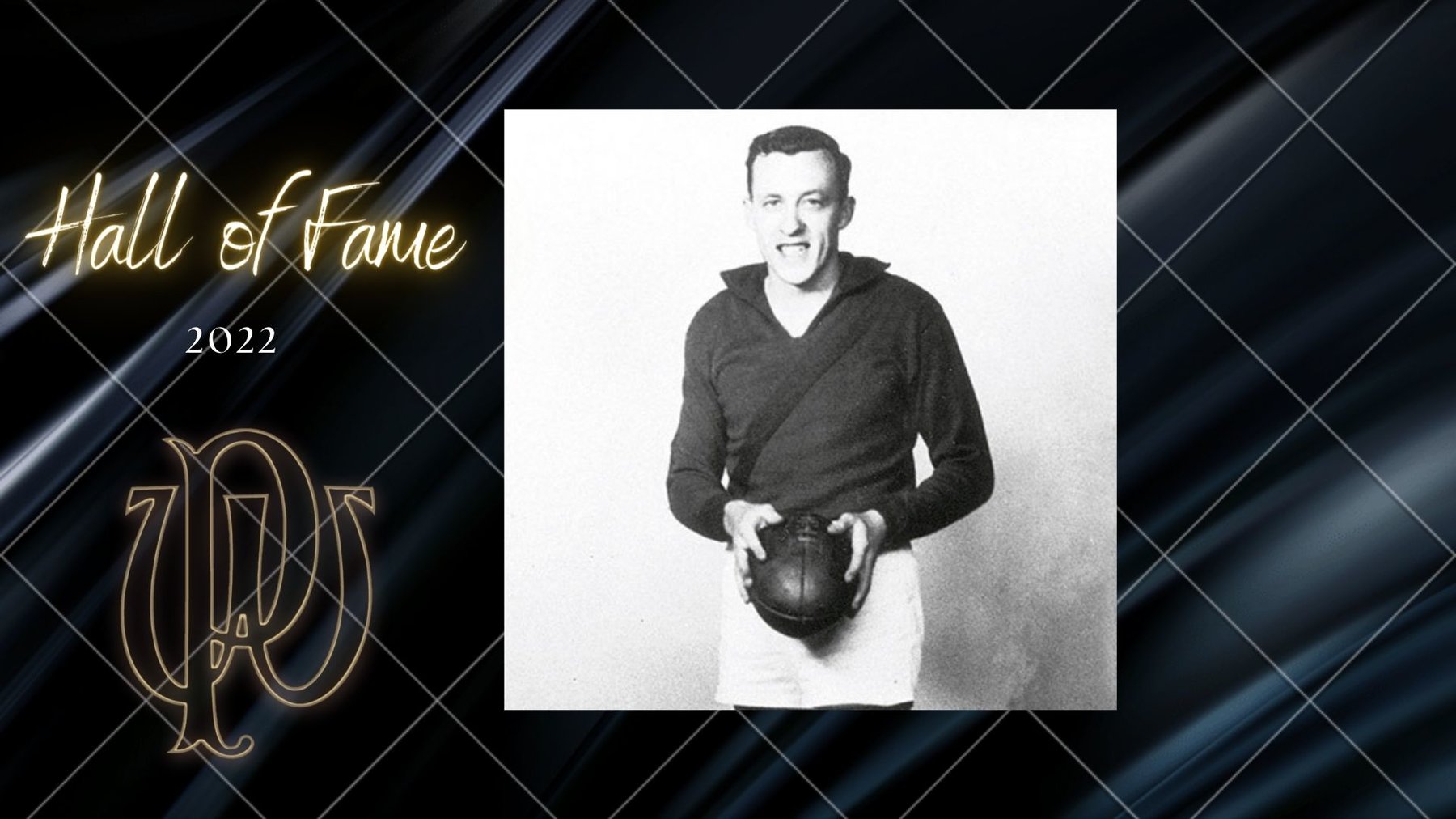
Fred Buttsworth
FREDERICK JAMES (FRED) BUTTSWORTH, Born 29th May 1927 to Frederick Richard Buttsworth and Lillian Frances (nee Cameron) in North Perth.
His mother being catholic enrolled him in Sacred Heart Convent to start his education.
He was frightened by the dark habits the nuns wore; quite often, when his mother returned home, Fred was waiting on the front doorstep for her return. He eventually attended North Perth Primary School and later his secondary education at Perth Boys School.
It was here that his sporting prowess came to attention, winning High Jump Competitions and in playing both Football and Cricket to a high standard. Lessons bored him and he left school at 14.
During the war years league football was cancelled, as we know it and a combined competition was played between Clubs. He won his first league grand final at West Perth in 1942 aged 14.
In 1944 he was appointed captain of West Perth. He won the Fairest and Best and was the Clubs leading goalkicker with 78 goals. He played at Centre Half Forward and was runner up in the Sandover Medal.
In 1945 he joined the Navy going to Flinders Naval Base near Sydney for his 6-month training course and he was there when the war ended. He was then posted to Port Melbourne, Victoria and joined the Essendon Football Club where he played 8 games (kicked 9 goals) alongside his brother Wally. Wally became a legend at the Essendon Football Club playing many games and becoming a member of Essendon’s Team of The Century. Wally had also played at West Perth before moving to Melbourne.
Whilst in the Navy, Fred served on board HMAS Australia and the troop carrier Menora. This latter vessel was tasked transferring Australian troops to near Hiroshima, Japan who were part of the Occupational Forces. This vessel returned to Australia via Fremantle and it was here on May 15th 1947 he received his discharge papers.
He returned to West Perth and gained employment with Postmaster Generals Department at Perth Post Office.
Fred also excelled at cricket playing 14 seasons at North Perth Cricket Club scoring 6434 runs at an average of 36.76 with 13 centuries. This form saw him selected for Western Australia in their inaugural Sheffield Shield season 1947/1948. He played 8 matched for WA, scoring 343 runs at an average of 22.86. He also was a member of the first ever Sheffield Shield winning team for Western Australia.
Fred’s brother Brian, played 1 game for West Perth but preferred cricket and he also played at North Perth Cricket Club.
Fred left the Post Office and joined a clothing manufacturer, Mercia Modes where his job was delivering clothes to shops around Perth. It was here he met his future wife Vilma Bowra.
In 1949 he won a premiership with West Perth.1951 was a memorable year for Fred and the West Perth Football Club. For the fifth successive year he was selected to play for WA. In one match in a losing side to Victoria his performance won him a Simpson Medal from a half back flank. Newspaper headlines at the time printed “BUTTSWORTH v VICTORIA”.
Also, in 1951 Fred won the very first “Daily News 50 pound Footballer of the Year Award.”
West Perth again won the premiership (both in league and reserves).” Winning the special Federation Jubilee Cup. Fred won West Perth’s Fairest and Best and to cap of a stellar season he also won the Sandover Medal.
In 1953 he only played 10 games due to a torn thigh muscle injury. It never healed properly and thus saw the end of Fred’s football career at the age of 26. He did however continue his cricket career at North Perth, captaining them to premierships in 1957/58 and 1958/59.
In 1950 he had begun working for the Department of Civil Aviation. In 1959 he spent 2 years on the Cocos Islands.
He again went back for another 2 year stint in 1965 this time with the whole family. He retired in 1989 after spending nearly 39 years with the department.
In total Fred had an amazing sporting career winning many accolades along the way.
Presented with the Australian Sports Medal 2000 in that year as an outstanding Sheffield Shield performer for cricket.
Fred passed away on May 11th 2021 (aged 93). He is survived by daughters Lee and Dale and sons Gary and Ray.
- WPFC 1942-1945, 1947-1953
- 182 games
- 264 goals
- 18 state games
- 98 career Sandover Medal votes
- Sandover Medal winner 1951
- Simpson Medal winner 1951 (WA)
- Breckler Medal winner 1944, 1951
- WPFC premiership player 1942, 1949, 1951
- WPFC leading goalkicker 1944
- WPFC captain 1944
- WA Football Hall of Fame member
- WPFC Team of the Century (centre half-forward)
- WPFC Life Member
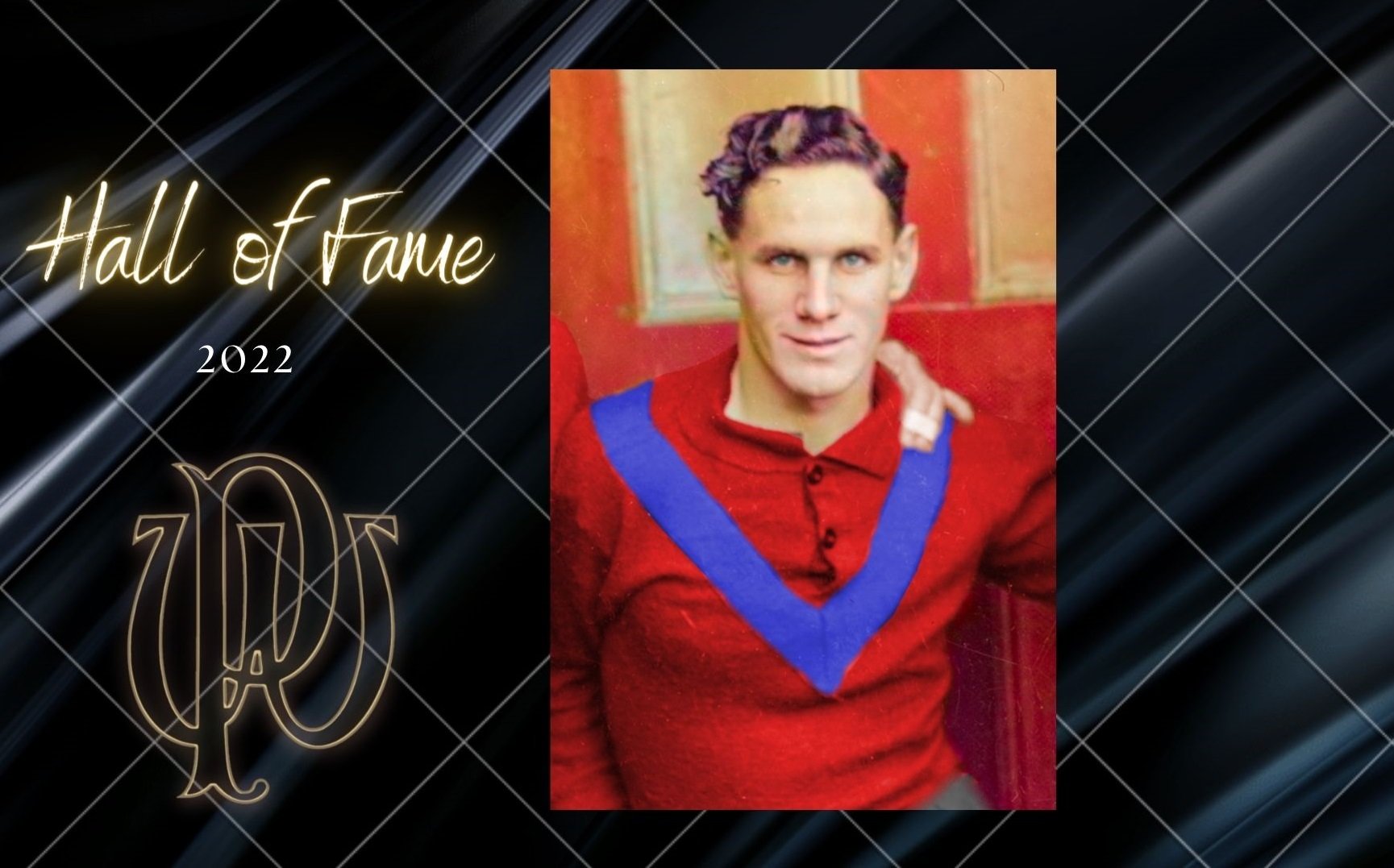
Wally Price
Walter John “Wally” Price (born 2 June 1926) in Margaret River, was a wonderful legend who played for the West Perth Football Club. He was married to Wynne for 66 years and had five wonderful children and many grandchildren and great-grandchildren. He passed away at the ripe old age of 95 years.
Wally’s older brother, Henry (Harry), also played 56 games, 2 for West Perth and 53 games for Claremont. A younger brother David played 40 games for West Perth. Originally growing up in York Wally started playing in the Metropolitan Junior Football Association (MJFA).
Wally worked as a boilermaker with the Government Railways, with work, football, and his family, he was too busy to pay much attention to other sports at which he has shone.
For two years (1945-46) he was senior belt and senior surf champion of the Scarborough Surf Club and as a second-grade cricketer with East Perth. He scored enough 50s to merit a few first-grade game.
Wally Price debuted for West Perth in the age-restricted war-time competition in 1942, at the age of 16, and played in a premiership in his first season. Fred Buttsworth also debuted at the age of 14 years.
In 1941 it had been a difficult year for the WAFL due to the World War, with many clubs losing many players to the war effort. The League introduced a rule that only players who turned 18 at October 1942 could play. This meant some great stars of the era – like Bill Rainoldi, Norm McDiarmid and Max Tetley had to retire.
He immediately assumed the back pocket position and although only small in stature, he had pace and a delightful long clearing dropkick. He was also a superb reader of the play and played his opposing resting rovers so closely that they seldom caused scoreboard damage whilst on him. Although tough and resolute his methods were very fair and he rarely gave away a free kick.
The 1942 West Perth side coached by Joe Brooker (who was the father of Dolores and who later became the father-in-law of the late Ronnie Bewick and grandfather of all the sons Cory, Darren, Rich and Glen who all also played for WP), contained many future stars including Len Harman and Fred Buttsworth, and Wally occupied the left back pocket position in both the 1942 Second Semi and Grand Final victories.
The following year Ray (Homer) Schofield commenced with the club and he and Price developed a near perfect understanding in the last line of defence that was to last for over 10 seasons in both WAFL and state football.
Price’s ground play and anticipation were a great foil for Schofield’s strong spoiling tactics and the pair went on to represent Western Australia on 12 occasions together between 1947 and 1953.
Wally made his interstate debut for Western Australia at the 1947 Australian National Football Carnival, held in Hobart and then also played in the 1953 Carnival, held in Adelaide.
Price celebrated a second premiership success in 1949 but the 1951 Grand Final was his finest moment.
West Perth took a 17-point lead into the final quarter, but the defence had to withstand a barrage of attacks by South Fremantle kicking with the aid of a strong breeze. The difference was down to 3 points with 2 minutes remaining and the Sunday Times reported that “Price, who had defended stoutly all day, and Schofield were remarkably cool under fierce pressure and won the game for the Cardinals”.
Although Don (Mary) Porter won the Simpson Medal, the performance of Price and Schofield in the hectic final minutes of that game will long be remembered by West Perth faithful. Wally wryly reckons he should have won the Simpson.
Wally missed only 15 games in his 12 years of league football, which is an amazing record. Wally had only three real injuries in his football career, which have been entirely his own fault. Though normally a most reliable kick, he has unaccountably lapsed on several occasions and kicked the ground while doing the drop-kick. Three injured ankles have been the result.
In 1952 Wally Price won West Perth’s Fairest and Best award, the Breckler medal, ahead of a champion field but the club lost the Grand Final against the outstanding South Fremantle team.
Wally played in 8 Grand Finals (1942,1946, 1947, 1948, 1949, 1951, 1952, 1953) winning three premierships (1942, 1949, 1951).
The unsung position of back pocket specialist is never likely to produce a Sandover Medallist, but Wally Price was one of the best of many fine WA players to fill this vital defensive role. He was so effective at curbing the star rovers of his time. A compact 5ft 8in and 11st 4lb, Price has the happy knack of altering his game to suit the occasion. He prefers the game to be fast and open, but he is perhaps even more ruthlessly efficient when the occasion is a big one and the consequent tenseness leads to rugged, hard bumping passages.
At the end of the 1954 season at the age of 28, Price retired from the WAFL to accept the position of captain coach of the Griffith Football Club in New South Wales.
He held the West Perth club record of 256 games and but for this coaching opportunity he may well have become the first WAFL player to play 300 league games.
He was later appointed coach of the West Perth reserves team (1958 and 1959) and in 1960 joined the WAFL umpiring panel serving for four years umpiring mainly country matches.
In the 1960’s Wally Price was instrumental in the formation of the prestigious WA 200 Club and remained a regular attendee at West Perth matches.
He was unanimously selected in the back pocket in West Perth’s Team of the Century in the year 2000 and his effectiveness was recalled by Mick Cronin in the Daily News in 1967, “Wally Price tops the poll in my book as the greatest back pocket specialist. He had all the essential qualities of a good footballer. Most notable were his ability to read the play and his beautiful clearing kick which invariably turned defence into attack.”
He was named the Club’s Ball Legend in 2005 and inducted into the West Australian Football Hall of Fame in March 2010.
Wally’s service to our club extended well beyond his playing days. He was coach of the Reserves team in 1958 and 1959 and joined the West Perth committee of management (board) in 1964. Until recently, Wally was a regular supporter at our games. In more recent times Wally was unable to get to the football as often as he would have liked, but he continued to follow the fortunes of our club and those of the player group with great interest.
Wally passed away on the 17th of June. He will be deeply missed.
- WPFC 1942-1954
- 256 games
- 4 goals
- 12 state games
- 27 career Sandover Medal votes
- Breckler Medal winner 1952
- WPFC premiership player 1942, 1949, 1951
- WA Football Hall of Fame member
- WPFC Team of the Century (back pocket)
- WPFC Life Member
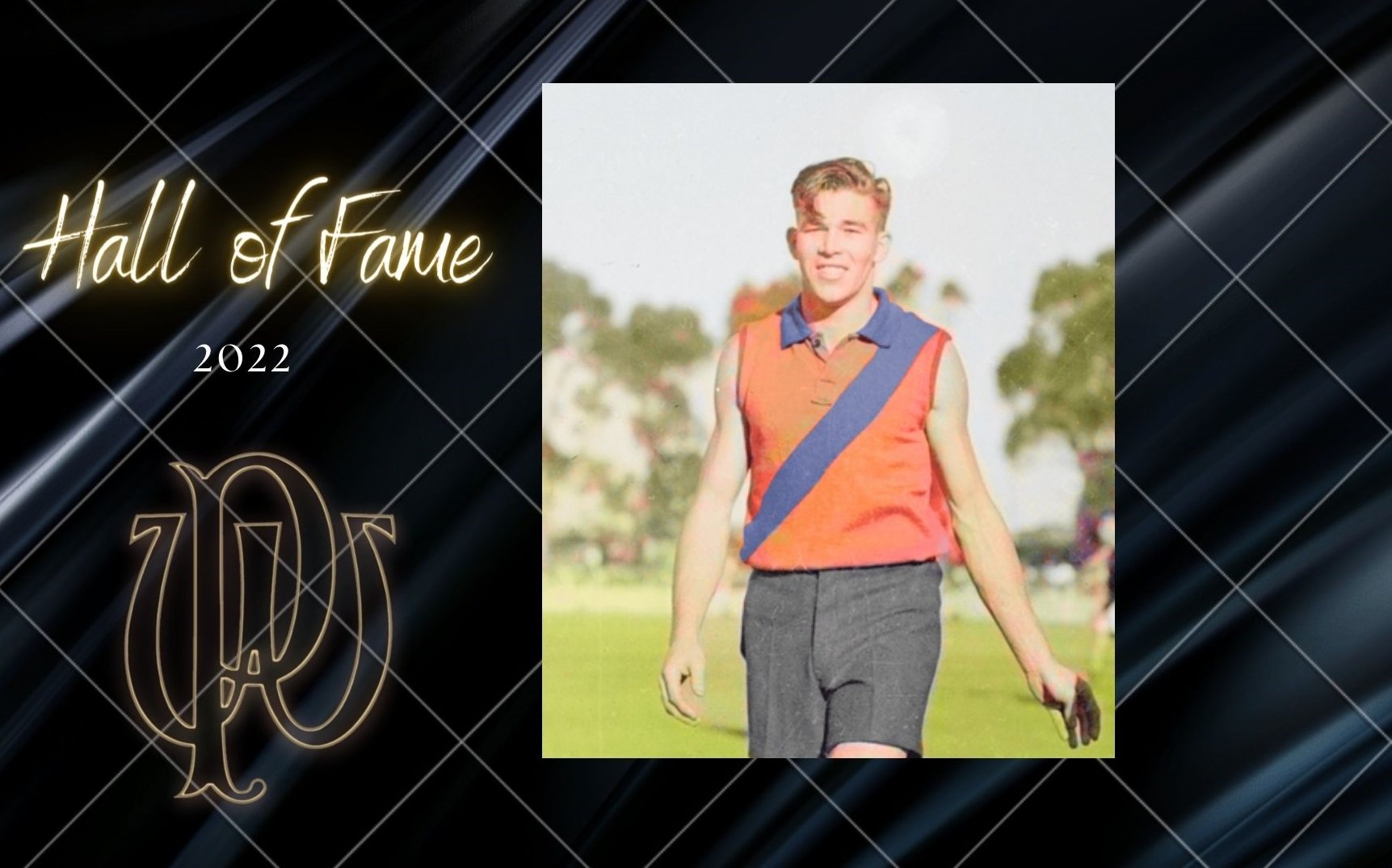
Ray Schofield
RAYMOND JOHN “HOMER” SCHOFIELD was born at King Edward Memorial Hospital in Subiaco to Charles and Lilian Amelia (nee Johnson) Schofield, on 1/8/1925. He was one of seven children, the others being Arthur, Charles Jnr, Ken (Mick), Sue, Winifred, and Trevor.
His early days were spent in West Perth where he attended both Thomas St. Primary School, Thomas St., West Perth and CBC Leederville, Oxford St., Leederville
He left school at the age 14 and joined his brother at Vinegar Brewery, Golding St., West Perth. The company later moved to Price St., Wembley. He remained with this company until retirement.
He married Valma (nee McNamara) Schofield, and they had 2 children Kevin and Marilyn.
They lived in Joondanna for many years before moving to Mandurah after retirement.
Ray began his football career as a full-forward in the wartime in the under 19 competition and headed the WANFL Competition in 1943 (93 goals). This wartime competition is not recognised in some sources.
In 1944-1945 he did not play due to service with Royal Australian Air Force in World War 2.
He made his senior WANFL debut in 1946. Played as a forward in the losing 1947 grand final.
Coach Stan “Pops” Heal eventually moved him to full-back where he excelled over the next decade.
As full-back he was West Perth best and fairest five times 1948,1950,1953,1954 and1955. He played in West Perth premierships in 1949 and 1951. His battles with South Fremantle full-forward Bernie Naylor were memorable just by themselves. Towards the end of his career, he returned to the forward line and was West Perth leading goalkicker in 1957. He became captain coach in 1958.
In his final season of 1958 in round 10 he played his 248th game to become WA elite football career games record holder. He then became the first elite football player to play 250 games.
He retired with 259 games and 169 goals to his record. These figures exclude the 18 games and 93 goals in the 1943 underage competition. Thus, his total games for West Perth is 277 games with 262 goals.
Ray also played 22 interstate football matches for WA including the 1950 Brisbane and 1953 Adelaide Carnivals.
He was selected as full-back in West Perth’s official “Team of the Century” and in 2004 was one of the inaugural inductees in the WA Football Hall of Fame.
His brother Trevor Schofield also played for West Perth (147 games) and Claremont (18 games).
After West Perth he played a few seasons in Sunday League before returning to West Perth in 1963 as a trainer alongside his old friend Roy Ennis. He did this every training night and every game until 1990.
Even after retiring to Mandurah, he would regularly catch the train to Joondalup to watch his beloved Cardinals/Falcons.
Ray passed away on 23/12/2017, at the Age of 92.
- 277 games
- 261 goals
- 23 state games
- 72 career Sandover Medal votes (best finish 4th in 1950)
- Breckler Medal winner 1948, 1950, 1953, 1954, 1955
- WPFC premiership player 1949, 1951
- WPFC leading goalkicker 1943, 1947, 1957
- WPFC captain 1952, 1957. WPFC captain-coach 1958
- WA Football Hall of Fame member
- WPFC Team of the Century (full back)
- WPFC Life Member
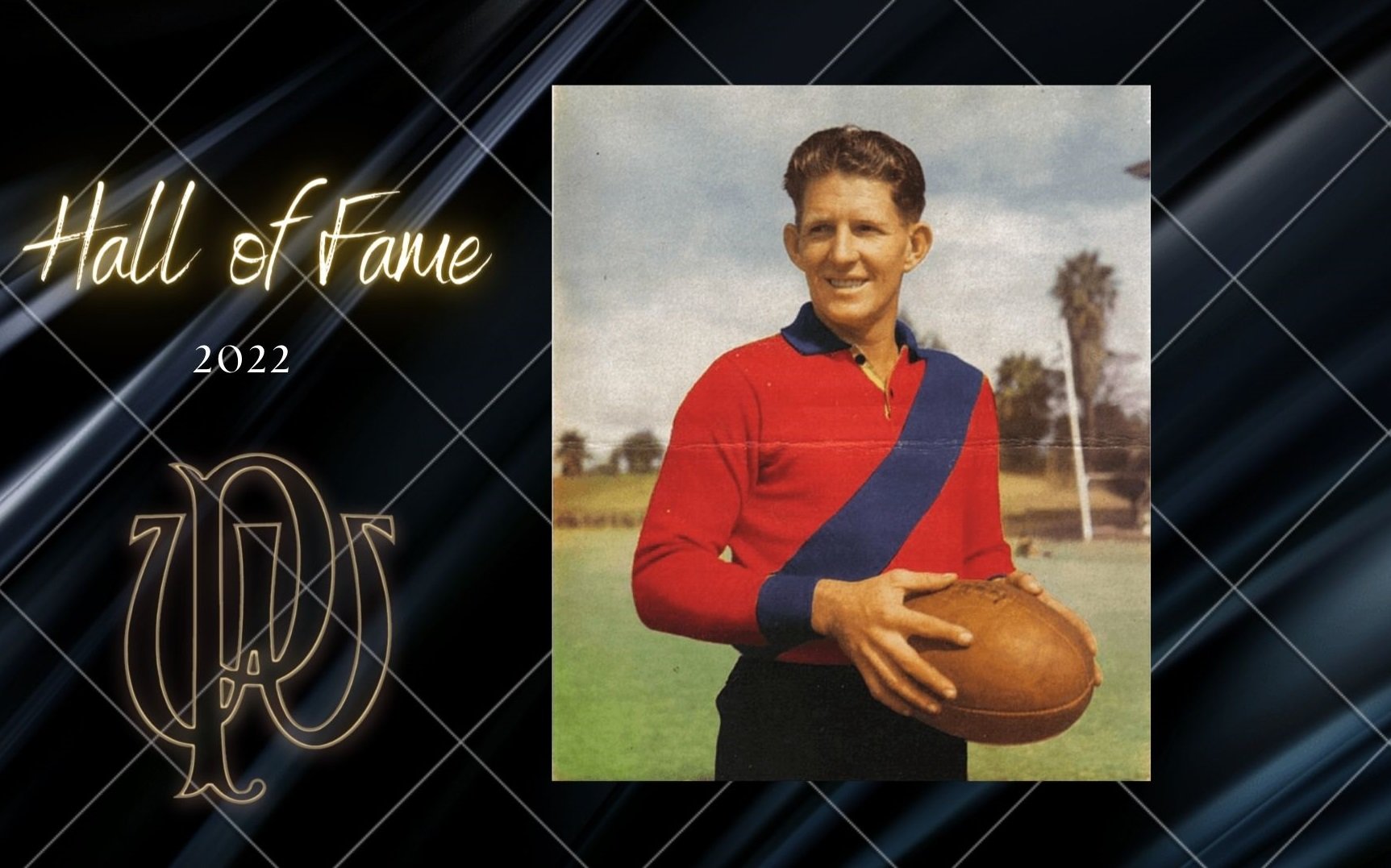
Ray Scott
Raymond Cyril Scott was born on 17th April 1927, and made his debut for West Perth in 1944 when the WANFL replaced the league with an underage competition during WWII. This was introduced because many league players over the age of eighteen years had joined the armed services, therefore making it difficult for clubs to field a consistent team.
During this time, Ray played as a ruckman or at centre-half-back and showed great promise. He then enlisted in the Royal Australian Navy in 1945 and didn’t re-join West Perth until 1947. Ray Schofield had been a dominant full-forward in the underage competition, and in the first game of 1947 kicked 8 goals against East Perth, but during the season, coach Stan ‘Pops’ Heal replaced him at full-forward with Ray Scott and moved Schofield to full-back. Both players went on to be champions in their respective positions, and became legends at West Perth, WANFL, and Western Australian football.
Other than Ted Tyson (1930-1941, 1945), there has been no finer full-forward than Ray Scott to pull on the red and blue jumper. From 1948 he topped the Cardinals goal kicking on eight consecutive occasions, and if his career had not coincided with champion South Fremantle full-forward Bernie Naylor’s, he would no doubt have been the premier full-forward of that era. Naylor was the leading goalkicker six times during 1946-1948 and 1952-1954, but Ray stole the award from Bernie in 1951 by kicking 141 goals for the season, and again won the award in 1955 with 83 goals. 1952 turned out to be an amazing season for these two remarkable full forwards, Ray was leading Naylor by 3 goals with three games to play. In the third last game Ray kicked 11.5, but in the Fremantle derby, Naylor booted 19.1 out of South Fremantle’s total of 24.9 to take the lead. In the final two matches Ray kicked 14 goals, but Naylor kicked 18, and won the goal kicking honors by 9 goals.
In 1954, on the Monday before the preliminary final against South Fremantle, Ray was working on the new extensions to the Royal Perth Hospital when he fell from the ninth floor. Fortunately, he landed on the roof of a construction lift which saved his life, but his injuries prevented him from playing in the final, which South went on to win by 24 points. Missing Ray’s presence and goal front accuracy was a huge blow to the Cardinals, and this was evident in the final quarter, when they had to make up a deficit of 9 goals, and fought back hard, but their inaccuracy cost them dearly kicking 4.14.
In 1955 Ray was appointed playing coach of Turvey Park Football Club in the New South Wales Southwest League and played and coached in the Riverina region until 1959, then returned to Western Australia and played just two more games for the Cardinals.
At 33 years of age Ray’s attention turned to umpiring, and in 1961 he umpired his first league game, followed by his first Grand Final in 1963. His rapid rise saw him appointed as umpire for the interstate clash between South Australia and Victoria in 1964, and he later officiated at the 1967 and 1968 WANFL Grand Finals. Ray’s style so impressed the Australian National Football Council that they requested him to umpire the game between Western Australia and Victoria at Subiaco Oval in 1968, which was at that time unusual, because the umpires were normally selected from a neutral state. Ray retired from field umpiring in 1970, but continued as umpire’s coach, and in 1977 went on to be the WANFL Umpires Advisor. Later, in 1981 and 1982, he was elected as Chairman of the Umpires Appointment Board. Ray passed away in January 2003 at age 75.
The following statistics show that Ray Scott was dedicated and devoted to West Perth, and to Australian Rules Football. His on-field accomplishments are the hall marks of a champion, and he takes his place as one of the legends of our game.
- WPFC 1944, 1947-1955, 1959
- 197 games
- 910 goals
- 5 state representations
- 2 times premiership player 1949, 1951
- WANFL Leading goal kicker 1951, 1955
- West Perth leading goal kicker 1948 – 1955 (8 seasons)
- National Football League Award of Merit 1975
- WAFL Life Member 1995
- Australian Football Hall of Fame 1996
- West Perth Team of the Century 2000
- WPFC Life Member
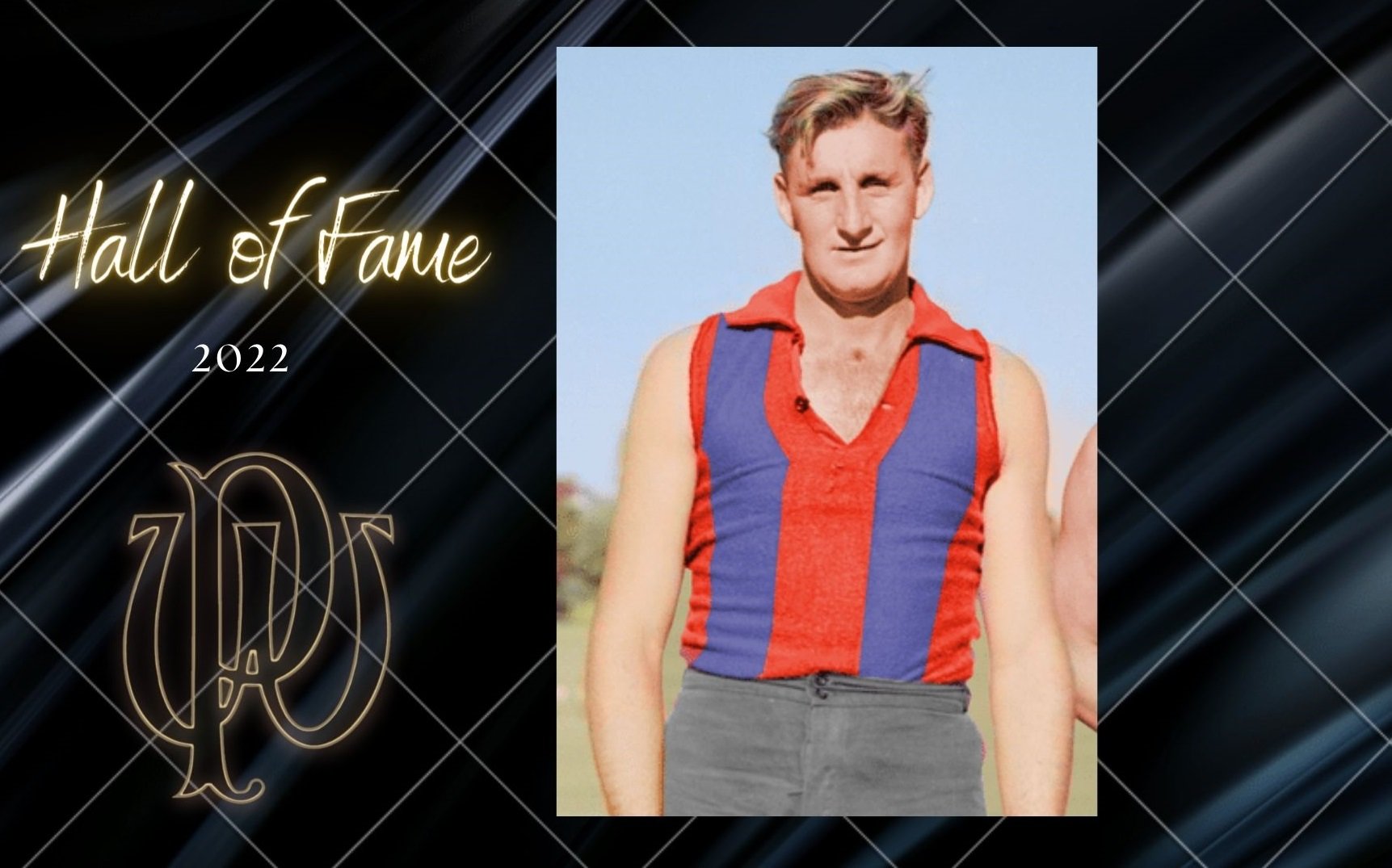
John Loughridge
West Perth’s inaugural Hall of Fame inductee celebrated his career during the 1940’s.
This was one of our greatest eras in our club’s history, where premierships, finals appearances and individual league accolades were plentiful.
John Loughridge, born 14 February 1923, grew up in Leederville in the heartland of West Perth. A gun junior footballer at Mt Hawthorn, earning state schoolboy selection aged only 12 years in 1935, Loughridge played his first game with West Perth in 1945, when the senior WANFL competition resumed after World War II.
Wearing number 10 and playing mostly as a centreman, Loughridge immediately made an impression, finishing runner-up in the Sandover Medal to Perth’s George Bailey, and winning the first of his three Fairest and Best (now) Breckler Medals.
In the following season, he went one better, winning the 1946 Sandover Medal with 26 votes. Also in 1946, Loughridge become a member of a mostly unwanted group, a best on ground performance in a losing grand final side; even his brilliant Simpson Medal winning effort was not enough to secure the Cardies the premiership in a close decider with East Fremantle, losing by six points. This defeat was the first of three consecutive grand final loses for West Perth. To cap off a remarkable personal season, Loughridge won a second West Perth fairest and best award.
On 7 August 1946, Melbourne’s Argus newspaper briefly reported upon the day’s upcoming fixture of a combined Richmond-Essendon side taking on West Perth, at Richmond. Some likely highlights of the game were noted. One of these was “a keen duel is expected between John Loughridge, an outstanding player in the West, and Ray Stokes, who has been shining in the centre for Richmond.” Stokes, recruited by Richmond from Tasmania, represented his home state in both football and cricket.
In 1947 and 1948, Loughridge maintained his outstanding form, being named best player in both final series of these seasons.
Finally, in 1949, Loughridge achieved premiership success, being instrumental in West Perth’s 10th flag when beating Perth by 30 points. Another sparkling year was recognised with his third West Perth fairest and best award. John Loughridge had a superb final series, named the Cardinals best in the second semi and third best in the grand final behind Larcombe and Ray Scott.
In his final West Perth year of 1950, Loughridge remained highly regarded and widely respected. In the preview of Saturday’s games published on 4 August, The Daily News noted the match-up of Loughridge and fellow champion centreman Sonny Maffina to be a much-anticipated clash in the West Perth v Claremont game.
Loughridge’s omission from that year’s state side was clearly controversial and evoked the ire of the media and football fans, as attested to by letters published in his support in The Daily News of 14 July. He had previously represented the state on ten occasions.
It was a surprise to many when John Loughridge announced his retirement at the end of the 1950, aged just 28 years. While this was largely due to his desire to concentrate on business interests, he briefly dabbled in football media and spent time on the West Perth Board. He was the driving force behind the Sandover Medallists’ club, serving as its president until his untimely passing on 4 November 1981, aged 58 years.
John Loughridge’s third club best and fairest award, an impressive mantel clock, is displayed proudly in West Perth’s memorabilia at the Joondalup clubrooms.
- 125 games
- 42 goals
- 10 state games
- Sandover Medal Winner 1946, runner up 1945
- 56 career Sandover Medal votes
- Simpson Medal winner 1946
- West Perth Fairest and Best (Breckler Medal) winner 1945, 1946, 1949
- WPFC premiership player 1949
- WA Football Hall of Fame member 2019
- WPFC Team of the Century (forward flank)
- WPFC Life Member
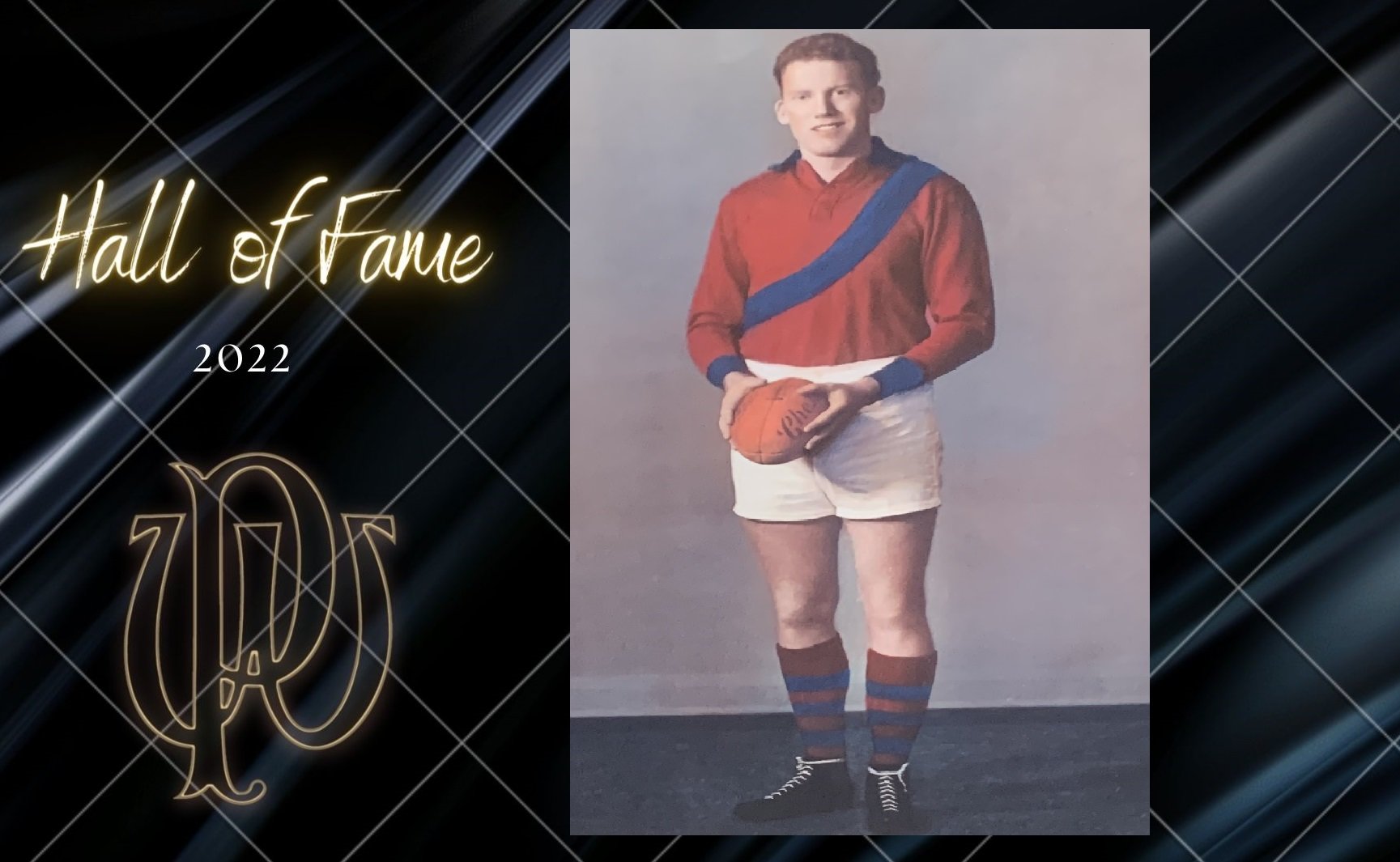
Brian Foley
Timothy Brian Foley (Blue) is a true legend of the game who commenced his career at West Perth in 1954. His story is one of perseverance as he struggled with his size and awkwardness in the early years playing in the Reserves. He made his debut in 1954 and gradually grew into his body to become one of the true great ruckman of his era.
Making up in dogged persistence for what he may have lacked in raw talent, Foley gave as good as he got against the likes of Polly Farmer, Jack Clarke, Merv McIntosh, and Keith Slater. All these adversaries had decorated careers and represented WA on multiple occasions. The fact that Foley made no fewer than 22 interstate appearances for Western Australia in an era when the state was blessed with considerable ruck strength is perhaps the most persuasive testimony as to his prowess, as well as to the esteem in which he was held.
From an individual perspective, Brian’s career went from strength to strength winning the Cardinals fairest and best trophy in 1957 and 1959. The highlight of Brian Foley’s illustrious 202-game league career came in 1959 when he was a runaway winner of the Sandover Medal winning by 10 votes (under the old 3-2-1 voting system. Brian also won every other award that year including WA Sportsman of the Year, Daily News and West Australian footballer of the year and the highly coveted Pelasco Oscar Award voted by opposition players. It was also the first season that he had been able to train regularly as he had previously worked in Northam.
From a team perspective, 1960 provided many highlights for Brian. He assumed the captaincy from Don Marinko five games into the season and remained captain until the end of 1964. More importantly, he led West Perth to victory in the 1960 grand final. The Cardinals defeated arch-rivals East Perth by 32 points and Foley was one of the most conspicuous performers on the ground, kicking three goals and winning the Simpson Medal for being the best player afield.
Given that he was playing at a time when VFL clubs were beginning to make significant inroads into Western Australia’s vast pool of playing talent it was inevitable that Foley should become a prime recruiting target. North Melbourne came closer than anyone to procuring him – Foley even signed a form four – but the Cardinals steadfastly refused to agree to a clearance.
Captain of West Perth from 1960 to 1964, Foley decided to play one last season in 1965 after Bob Spargo took over as captain-coach. He finished on a ‘high’, performing consistently well all year, as well as leading the ruck in typically resolute fashion when Western Australia came from behind to defeat the VFL in a mid-season interstate clash at Subiaco Oval.
Other accolades afforded Brian include induction into the WA Football Hall of Fame and also being named in the West Perth Team of the Century.
The Foley name lived on at West Perth with Brian’s son Dan debuting in 1980 and playing 58 games for West Perth prior to heading to Victoria where he played for Richmond from 1983 to 1985. also, is also the great uncle of current West Coast Eagles player, Luke Foley
- WPFC 1954-1965
- 202 games
- 242 goals
- 22 state games
- Sandover Medallist 1959
- Breckler Medal winner 1957 and 1959.
- Simpson Medal winner 1960
- WPFC captain 1960-1964
- WPFC premiership player 1960
- WPFC Team of the Century (Forward Pocket)
- WPFC Life Member
- WA Football Hall of Fame member
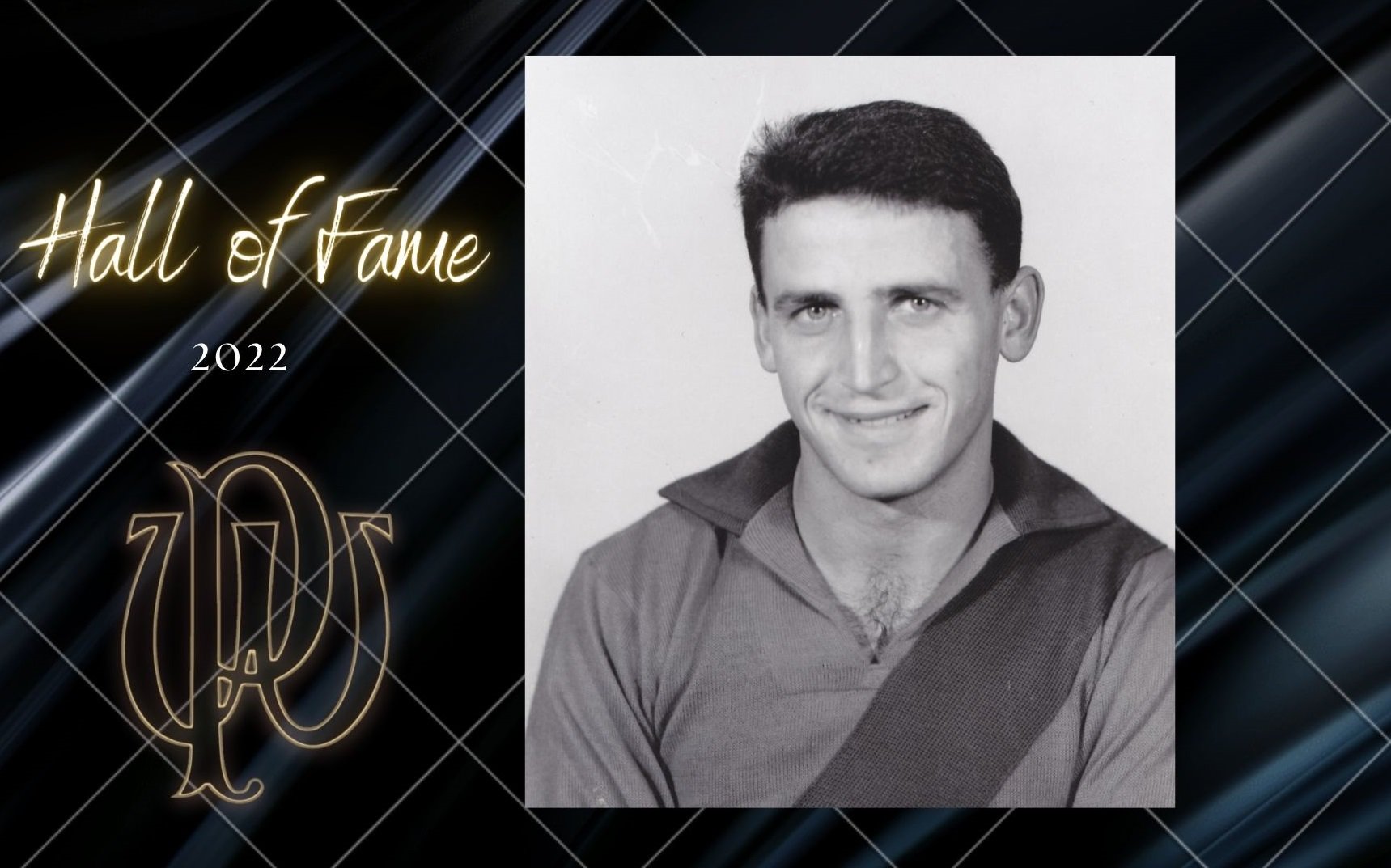
Brian France
Brian Leslie France (Puffer) is a true legend of the game who commenced his career at West Perth in 1958.
Brian started playing football at Leederville State School and North Perth Under 16s and then moved to Mt Hawthorn Metropolitan Juniors and played two years in 1956 and 1957. Brian was invited down to try out at West Perth in 1958 with captain coach Ray Schofield in charge. Brian played most of the year with the seconds. Don Marinko was appointed coach of West Perth in 1959 after seven years of brilliant football as a centreman. The club had a great list of good footballers, however only finished in 5th place outside the four by two games. Don Marinko was replaced by Arthur Olliver in 1960 which produced one of West Perth greatest years by winning the Premiership. Brian started playing at full back, however he became the owner of centre half back and won many a contest together with fellow players Ken Ashdown and Ray Marinko. Brian was selected in the West Perth team of the century at Centre half back. Brian had many tough games against Mal Brown, Austin Robertson, and John Gerovich.
Brian was affectionately known as ‘Puffer’, because of his habit of puffing up his cheeks when charging through packs in pursuit of the ball. Brian was an archetypal key position defender whose ambition every time he took the field was to keep his direct opponent kick less.
This was never better exemplified than during the 1966 Hobart carnival when Western Australia and the VFL met on the final day in what was effectively the championship decider. France was given the daunting job of minding Big V skipper Darrel Baldock, who had been in irrepressible form throughout the series, and for the better part of two quarters he almost literally wore ‘the Doc’ like an extra jumper. With their main route to goal blocked, the Vics looked uncharacteristically impotent, and the Sand gropers, five goals in front and playing superbly, seemed well on course for victory. Early in the third term, however, France was badly injured, and had to leave the ground, whereupon the hitherto unsighted Baldock immediately began to impose himself, enabling the Vics to eke out a 15-point win that at half time had looked distinctly improbable. Brian was named in the Australian Carnival team alongside teammates Mel Whinnen and Colin Hebbard.
The 1966 season ranks among France’s best even though he was runner-up to the dominant Bill Dempsey in the club Fairest and Best award. However, he was West Perth’s best-performer in the Sandover Medal, polling 18 votes to finish just behind roving greats Bill Walker (20 votes) and Barry Cable (19).
The next season saw him poll 18 Sandover Medal votes in the first 13 games to lead the count comfortably. But his career came to a premature end when he suffered a knee injury in round 14, with Bill Walker and John Parkinson gradually over-hauling him to share the Medal honours on 19 votes. Rival forwards regarded France as one of the toughest defenders in the game.
Extremely strong and fast, he had the capacity to nullify some of the greatest forwards the game has seen, with a combination of leading the play, outstanding marking, and a close-checking style.
Newspaper critics of that era often hailed France as the best key-position defender in Australia and certainly some rated him alongside the great South Fremantle centre-half-back Frank (Scanno) Jenkins, an inaugural member of the Hall of Fame. After another injury twelve months later, Brian France’s nine season, 159 game league career came to a premature end, although had the Cardinals allowed him the clearance, he desired to arch-rival’s East Perth it may have provided him with the incentive he needed to continue. The fact that France had still been playing football of the highest quality was emphasised when he finished just one vote adrift of joint winners John Parkinson and Bill Walker in the Sandover voting. Had he not missed seven matches through injury there seems little doubt that he would have secured the Medal, which would have been an appropriate way of sealing a distinguished career that also brought involvement in a premiership in 1960, two club fairest and best awards, and 17 interstate appearances.
His 1967 knee injury certainly brought a premature end to his career at the age of 27, with knee reconstructions an unknown treatment in those years.
- WPFC 1958-1967
- 157 games
- 2 goals
- 9 state games
- 65 career Sandover Medal votes (best finish 3rd in both 1966 and 1967)
- Breckler Medal winner 1963, 1965
- WPFC premiership player 1960
- WPFC Team of the Century (centre half-back)
- WPFC Life Member
- WA Football Hall of Fame member 2007
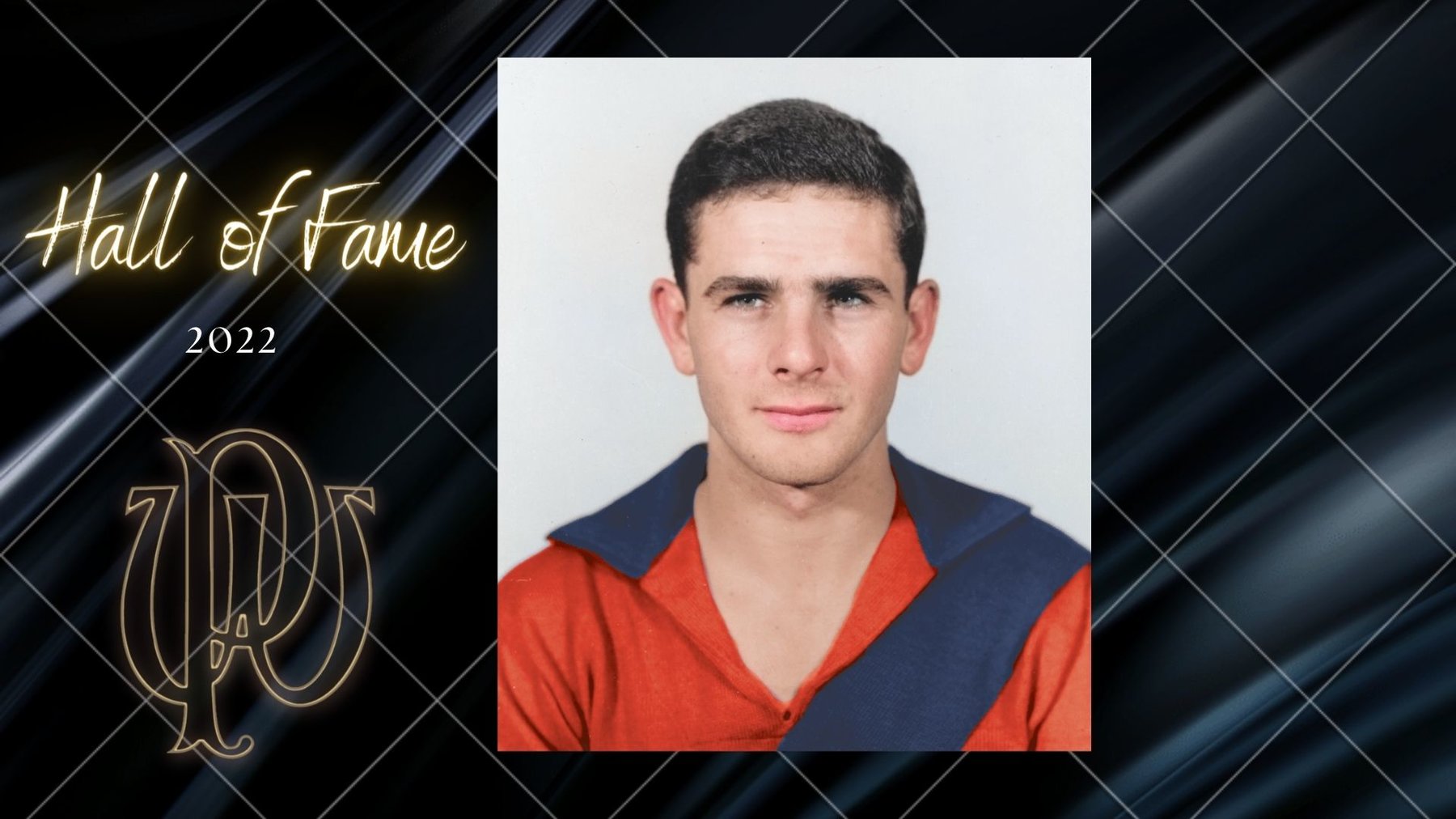
Mel Whinnen
Mel Whinnen was the epitome of all things great, with the game of Australian Rules Football. Throughout his 18-season, 371-game league career, Mel’s name was synonymous with both fair play and brilliance, the dual attributes which collected votes for all the top awards in Australian football. He was modest, almost apologetic but brilliant in his on-field leadership and his off-field demeanour.
Mel commenced his prolific league career in 1960. Playing six games that year, which included him coming off the bench in the 1960 premiership win over East Perth. Mel was privileged to play in three more premierships in 1969, 1971 and again in 1975. Mel played an amazing 365 games over 18 years of league football at West Perth, an achievement that we will never see repeated. Mel finally retired after the end of the 1977 football season.
West Perth was the team Mel had followed from the age of 5 or 6 and he identifies his idols as Brian ‘Blue” Foley, Frank Margaria and Joe Fanchi. The fact that he was privileged to train and play with his idols was a fact that Mel still cherishes. It was every boy’s dream!
Throughout his lengthy career, Mel proved to be a model of consistency supported by the numbers including 9 Breckler medals, 14 State games and accumulating 142 Sandover medal votes including two runners up finishes in 1964 and 1971. This vote tally is the highest by any player never to win a Sandover Medal. Indeed, it was arguably the fact that Whinnen could invariably be relied upon to perform at or near his best that distinguished him from the comparatively large group of players who warrant the description ‘good’ and made him instead a bona fide champion. He also won the Simpson Medal in 1975 for his best on ground performance in the grand final at the mature age of 33.
Consistency was a hallmark of Mel’s career. He trained and played with a determination second to none. He was quick and elusive which earned him the nickname of “Slippery” and he lived up to that nickname for his entire career. There have been very few players to play the game who when surrounded by opposition players provide a quick hip fake, run a 360-degree circle, and leave his opponent stranded without the ball. Many a player, have tried this quite simple manoeuvre with no or catastrophic results. This was just one of the hallmarks of the brilliance of Mel Whinnen that added to his nickname “Slippery.”
Always a sublimely elegant footballer, it was appropriate when, in 1976, Whinnen became one of a select band of players to be awarded an MBE. Bill Dempsey who mirrored Mel’s career in successes and longevity also received an MBE at this time. He retired a year later after West Perth lost the 1977 Preliminary Final to East Fremantle. It is doubtful if Leederville was ever home to a more prodigious or engaging talented footballer.
In October 2000, Mel was named in the centre in West Perth’s Team of the Century. Mel was an inaugural inductee of the West Australian Football Hall of Fame in March 2004. Mel had one of the entrance gates at Subiaco Oval named after him. The main grandstand at Arena Joondalup, West Perth’s home ground since 1994, is named the Whinnen–Dempsey Stand. This is in honour of two of the greatest players’ that have played for West Perth, the only two who have exceeded 300 games for the football club.
Mel had respect for all his coaches and acknowledges that they all contributed to his development over the years. He had a special respect for his premiership coaches who were able to extract the best out of each of the players. He states that Arthur Oliver was a commanding presence and very astute in his gamesmanship while Polly was the ultimate player who led by example and brought the team along with him. He attributes Graham Campbell (1975 premiership coach) as a great motivator and tactician which is supported by the fact that we had a couple of unbelievably bad losses during the year but never two in a row!
Whinnen’s contribution to our great game was acknowledged in 2018 when he was inducted into the Australian Football Hall of Fame.
While the accolades for Mel Whinnen are overwhelming and fully deserved it would be remiss not to mention the wonderful support that he has received from his wife Dawn and his sons. They are his biggest supporters and provided the support and sacrifices that need to be made for a career to unfold.
- WPFC 1960-1977
- 371 games
- 70 goals
- 14 state games
- 142 career Sandover Medal votes (best finish 2nd in both 1964 and 1971)
- Breckler Medal winner 1962, 1964, 1966, 1967, 1970, 1971, 1972, 1973, 1975
- Simpson Medal winner 1975
- WPFC captain 1977
- WPFC premiership player 1960, 1969, 1971, 1975
- WPFC Team of the Century (centre)
- WPFC Life Member
- Australian Football Hall of Fame member
- WA Football Hall of Fame member
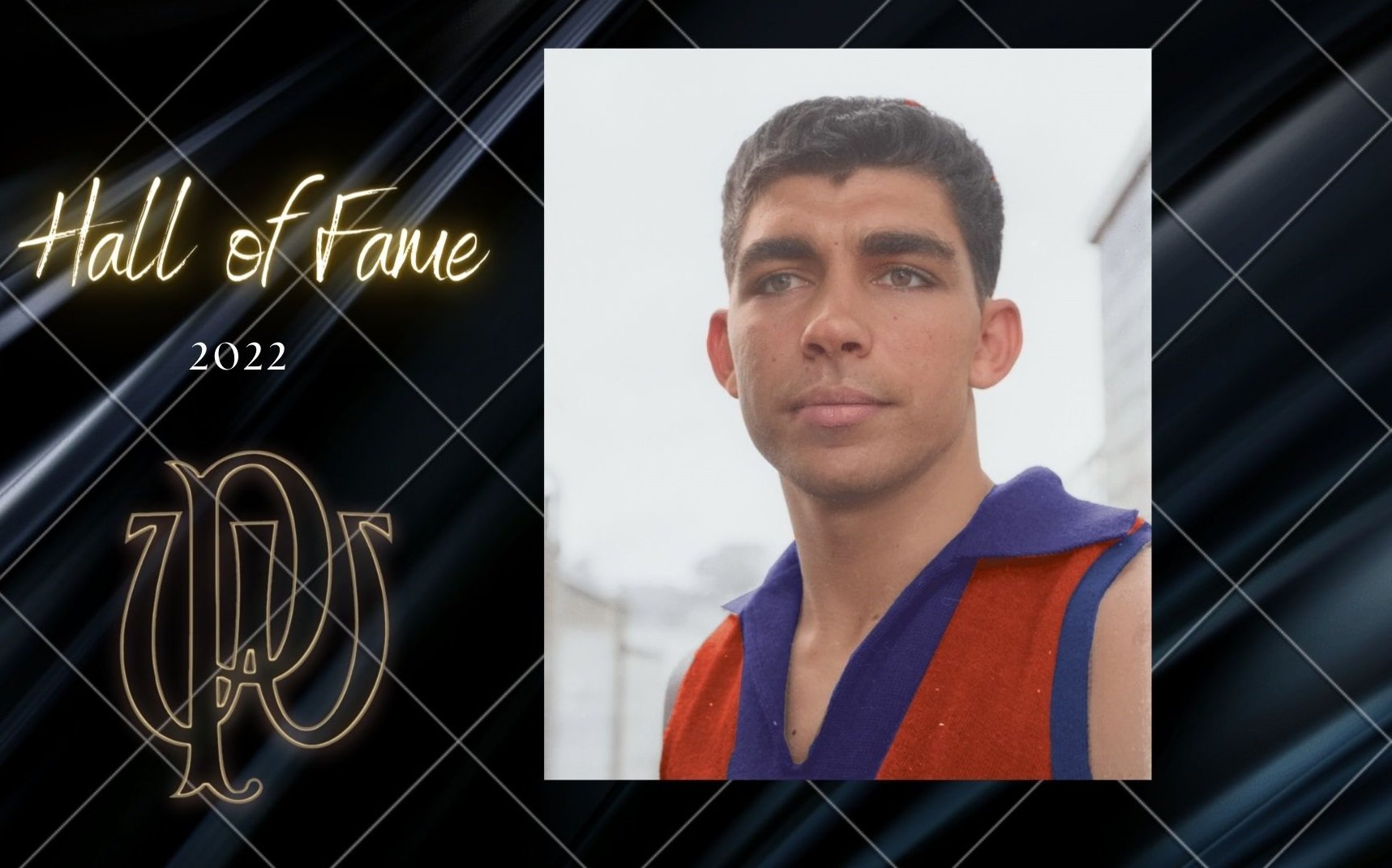
Bill Dempsey
Jimmy Anderson was a brilliant footballer and sportsman in Darwin, and he was recruited by West Perth in 1960. We were playing for the Buffaloes Football Club in the Northern Territory Football League at the time, and it was Jack Larcombe, a great player for West Perth who was part of their 1942, 1949 and 1951 premierships who recommended I also come down to Perth with Jimmy. Arthur Oliver had just been appointed coach and had come from Footscray in the VFL after coaching there for seven years.
My feeling was that even though West Perth wanted me as a player, I was also there to accompany Jimmy and keep him from returning to Darwin. As for me, it was an exciting time and I just wanted to see what life was like away from Darwin. I would have gone to China to play ping-pong had I been asked.
I seriously wanted to play basketball when I arrived in Perth, but I had made the commitment to play footy. Then one day Jimmy came to me and asked me to lend him a fair amount of money, which I did. He used it to go back home, and the footy club was frantically trying to contact him but he never came back, and years later when I caught up with him I asked why he took my dough and left me in the lurch. He said “You owe me, I knew you could make it in Perth, and if you had the money you would have followed me back to Darwin, so I’ve done you a big favour”. And he added, “That Simpson Medal you have at home really belongs to me”. How could I argue with that, so I just let it be. Jimmy was widely renowned as the ‘King’ in Darwin, a title he got from the Retta Dixon Mission where I met him. So being the ‘King’ you did what the ‘King’ requested, but there was truth in what he said, so thanks Jimmy, I do owe you. He sadly passed away in 2017 and I went to his funeral service which was so big they had to hold it at the Marrara Oval, the main stadium in Darwin.
Mel Whinnen (Winnie) and I started together at West Perth, but I sat on the bench for the first six games of 1960. I did all the warm-ups and never got on the ground. The rule then was unless an injured player had to be replaced you remained on the bench. Then on 28th May I got a run against Swan Districts at Leederville which we won by 39 points. I was so bloody nervous when I ran onto the ground in front of a 10,000 crowd, I still can’t recall who I played on, but it was a big thrill to be playing league footy at 18 years old. I was recruited as a centre-half-forward, but over 343 games I only played three games in that position.
Finals time came around in 1960, and the League and Seconds (Reserves) made the Grand Final. I thought I might be a chance to play in the Grand Final, but the club had a lot of depth, so I played Seconds. I was so happy for Winnie when he got the nod to play in the league grand final, what a great moment for him at 17 years old. The Seconds had a wonderful win, and there was going to be great celebrations, but the league side buggered it up for us by winning their grand final which shifted the focus to them. Kidding, of course, it was a magic day and the league side were fantastic in beating East Perth who many pundits thought would win. The Reserves premiership was the last the club would see until 2014, a span of 54 years.
The club had its ups and downs after 1960, Clive Lewington coached for one year (1964), and Bob Spargo coached for the next three years until 1967. Then in a surprise announcement, the club appointed East Perth and Geelong great, Graham Polly Farmer, as playing coach in 1968.
Polly completely changed the way we approached and played the game. The normal pre-season training sessions were thrown out the window, and it was nothing like we had ever experienced in any grade of football. At the beginning of pre-season training, and being a sticky-beak, I wanted to hear what Polly had to say, so I positioned myself near him and strength and running coach Bill DeGruchy. I overheard Bill say “how do you want me to run them Poll? Polly’s answer was, “Run ‘em till they spew, and make a note of any person who keeps running while they’re spewing”. I thought he was joking, but he wasn’t. The one thing that we all respected about Polly was that he didn’t issue instructions from the sidelines, he was in there with you, and never told anybody to do something that he wouldn’t do himself. He led by example, and we followed.
We were introduced to punching bags, which we would hold, while about 50 blokes took turns in charging full pelt at you. I used to hate it, but it gave us a hard edge, and Polly being a playing coach was never backward in coming down the ground during a game to hand out a verbal spray, so it goes without saying that he and I had a few run-ins from time to time. Polly was a perfectionist and expected the same from his players, it was his way or the highway, but he was a football genius which also earned him the respect of the players and the title of “the greatest player in the history of the game”.
In Polly’s first season in 1968, we were going really well and won 18 games, but for some unknown reason we were put out of grand final contention in straight sets, losing the second semi and preliminary finals. I can’t explain why that happened after being so dominant during the year. I can only put it down to just “one of those things” that happen in football when play doesn’t go your way.
It’s no secret that the move from Leederville to Joondalup has always been a sticking point with me. Leederville Oval will always be a sacred site to me with so many happy memories and great people. It’s where all my footy memories lie during my playing days, but wherever West Perth go, I go.
I consider myself very privileged to have been able to play 343 games and captain the club I love, and been honoured with life membership, and to have represented the state 14 times and met so many great people from inside and outside the football world, it’s been a fantastic journey.
Now, I’m not as mobile as I used to be, but I love this football club and the people in it, both past and present, for giving me the opportunities that have come my way. The bonds that have been forged over the years are still strong, and I go to the games as well as catch up with my team-mates and friends at the Cardinals Coffee Club every second Monday. The best thing that happened to me was coming to Perth and being part of the West Perth Football Club family. Long may it live. Up the Cardies!!
- WPFC 1960-1976
- 343 games
- 90 goals
- 14 state games
- 90 career Sandover Medal votes (best finish 5th in 1973)
- Breckler Medal winner 1966
- Simpson Medal winner 1969
- WPFC captain 1973-1976
- WPFC premiership player 1969, 1971, 1975
- WPFC Team of the Century (back pocket)
- WPFC Life Member
- Australian Football Hall of Fame member (2022)
- WA Football Hall of Fame member (2004)
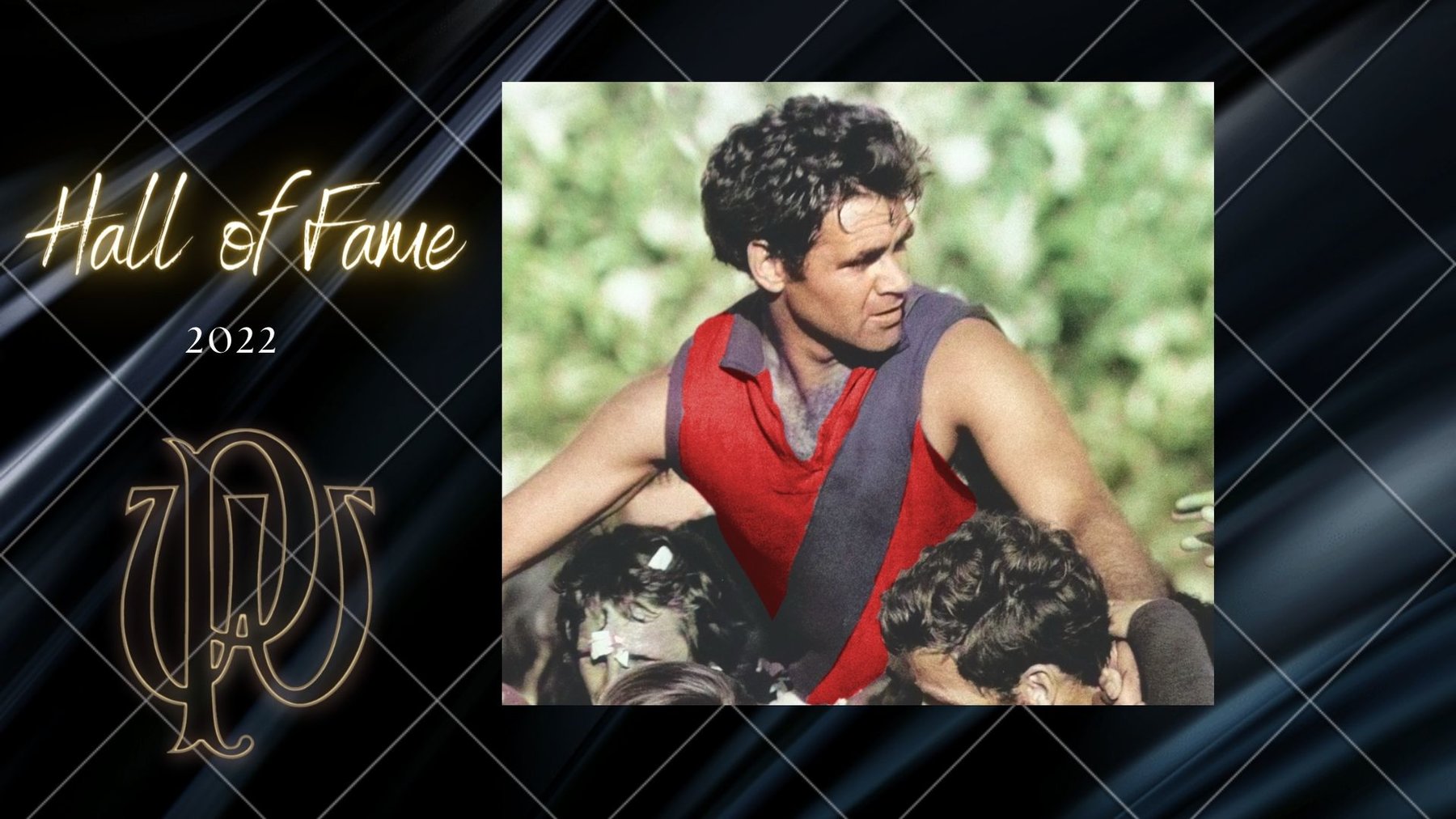
Graham Farmer (Polly) MBE
Graham Farmer is arguably the greatest player in the history of Australian Rules Football. His achievement at WEST PERTH were magnificent and give him the honour of our HoF. His career is even more amazing with achievements at East Perth and Geelong as detailed in the table below.
Graham was appointed captain coach of the West Perth Football Club at the end of 1967, following his illustrious career at the Geelong Football Club where his art of handball was instrumental in Geelong winning the 1963 premiership and making rover, Bill Goggin one of the game’s finest rovers.
As captain coach of West Perth in 1968, Polly led the team in his first year as coach to 18 victories out of 21 qualifying games however the team went out of the finals in straight sets.
That disappointed Polly greatly and much was learnt over the summer about the team’s approach and training methods. In the next season,1969, hours of physical work e.g. hitting punching bags and players repeating if the bump was not hard enough was installed.
Winning the grand final over East Perth in 1969 was testament to Polly’s astute coaching methods and the wonderful example he set on the ground as a playing coach at the age of 34.
1970 was disappointing, however, again, lessons learnt enabled the team to provide Polly with another premiership in 1971. The grand final was his 393rd and final league football match at the age of 36.
Polly’s engaging personality, hardness (but fair), on field playing example and training methods rubbed off on all players and his pre finals motivational speeches were reminiscent of Churchill’s wartime addresses. The players loved him, and he loved all his players.
WEST PERTH RECORD
- 79 games
- 54 goals
- 4 state games (while at WPFC)
- 40 WPFC career Sandover Medal votes (best finish 2nd in 1969)
- WPFC captain-coach 1968-1971
- Breckler Medal winner 1969
- WPFC premiership player 1969, 1971
- WPFC Team of the Century (ruck)
- Australian Football Hall of Fame member (legend)
- WA Football Hall of Fame member (legend)
OVERALL FOOTBALL RECORD
- SANDOVER MEDAL WINNER (1956, 1957/1960)
- GEELONG F & B (1963, 1964)
- GEELONG PREMIERSHIP (1963)
- EAST PERTH F& B (1954, 1955, 1956, 1957,1959,1960, 1961,)
- EAST PERTH PREMIERSHIPS (1956, 1958, 1959)
- ALL AUSTRALIAN 1956, 1958, 1961
- COACH WEST PERTH 1968-1971, GEELONG 1973-1975, EAST PERTH 1976-1977
- LEGEND- AUSTRALIAN HALL OF FAME
- AFL TEAM OF THE CENTURY
- WA FOOTBALL HALL OF FAME-LEGEND
- WA HALL OF CHAMPIONS
- AWARDED MBE 1970 for services to football
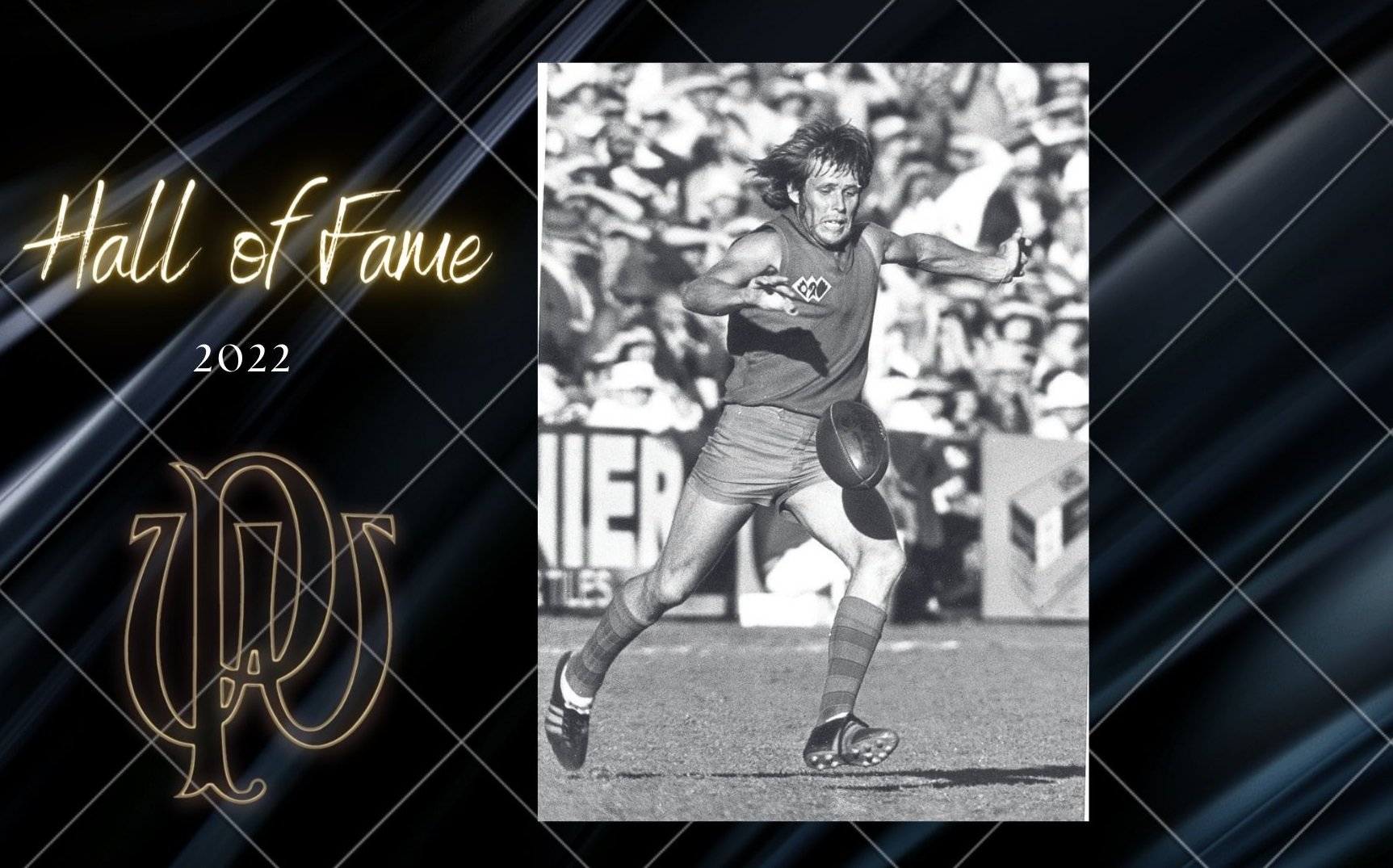
Alan Watling
Alan Watling – Was the hard running link man for West Perth between 1969-1983, and a driving force in the club’s 9 finals appearances during that time, which included three premierships in 1969, 1971, 1975. His career spanned 15 seasons and 284 games. Alan played all his junior football with the Cardinals Football Club at Lake Monger oval, but due to the construction of the Mitchell Freeway the club had to move to Menzies Park in Mount Hawthorn, which was fortunately only a short walk from his home. His skills and versatility didn’t go unnoticed, and he received a letter from West Perth inviting him down to training.
He graduated to the Fourths under coach Geoff Hamel, and then to Thirds under Don ‘Mary’ Porter. In 1968 Alan was selected in the Thirds grand final side to play East Perth but came down with a severe bout of influenza and couldn’t take part. The team went on to win the club’s first ever Third’s premiership by 5 points. In 1969 Don Porter urged coach Graham ‘Polly’ Farmer to give Alan a league game, and in an intraclub scratch match Alan, playing as a half forward, impressed by kicking four goals in half a game.
The following week, VFL club North Melbourne arrived in Perth to play West Perth in a pre-season match. Alan was selected to unofficially play his first league game on a half-forward-flank and lined up on Denis Pagan who later coached North Melbourne to premierships in 1996 and 1999. Alan’s skills, stamina and accurate disposal were a feature, and he excelled by kicking two goals and was named West Perth’s best player. At the next weeks training session after the North Melbourne game, Alan broke his hand, and missed the first four weeks of the 1969 season, and then spent three weeks in the reserves building his match fitness. On 24th May, and 31st May 1969 he was selected in the league side starting on the bench, but on both occasions only had about 10 minutes match time in the final quarters. The next week on 7 th June 1969 was Alan’s lucky day. He was destined to play reserves because the league team was a strong combination despite the absence of captain/coach Graham Farmer and David Dyson who were away with the State team for the Australian Football Carnival in Adelaide.
In Farmer’s absence Mel Whinnen was appointed interim coach. During the week, John Wynne received a call-up to replace an injured player in the WA carnival side in Adelaide, therefore Keith Miller was moved to centre-half-forward, and Alan was selected in the starting eighteen to play on a half-forward-flank against Swan Districts at Leederville. Alan grabbed his chance and had a major influence on the game by kicking 5 goals on tough Swan Districts defender Lou Milanko, and the team ran out winners by 33 points. From that point, he went on to play in four WAFL grand finals in his first seven years, and at only 27 years of age had three premiership medallions to his name.
He joins champion Les Fong in third position for the number of games played for West Perth, (both have played 284 games). Alan and his best mate since school days, Stephen Smeath, often worked out strategies on how to get the ball to one another on match days, to great effect, and earned them the title of the Dynamic Duo. Alan Watling is a legend of West Perth and WAFL football. A greatly respected player by his teammates, opposition players, and the football public. His achievements are testament to his skills and dedication to the game he loves.
- WPFC 1969-1983
- 284 games
- 323 goals
- 5 state representations
- All Australian team member (1972 Carnival)
- 3 times premiership player 1969, 1971, 1975
- Dinny Heaney Cup (best on ground, second semi-final 1975)
- West Perth Team of the Century 2000
- WA Football Hall of Fame 2009
- WPFC Life Member
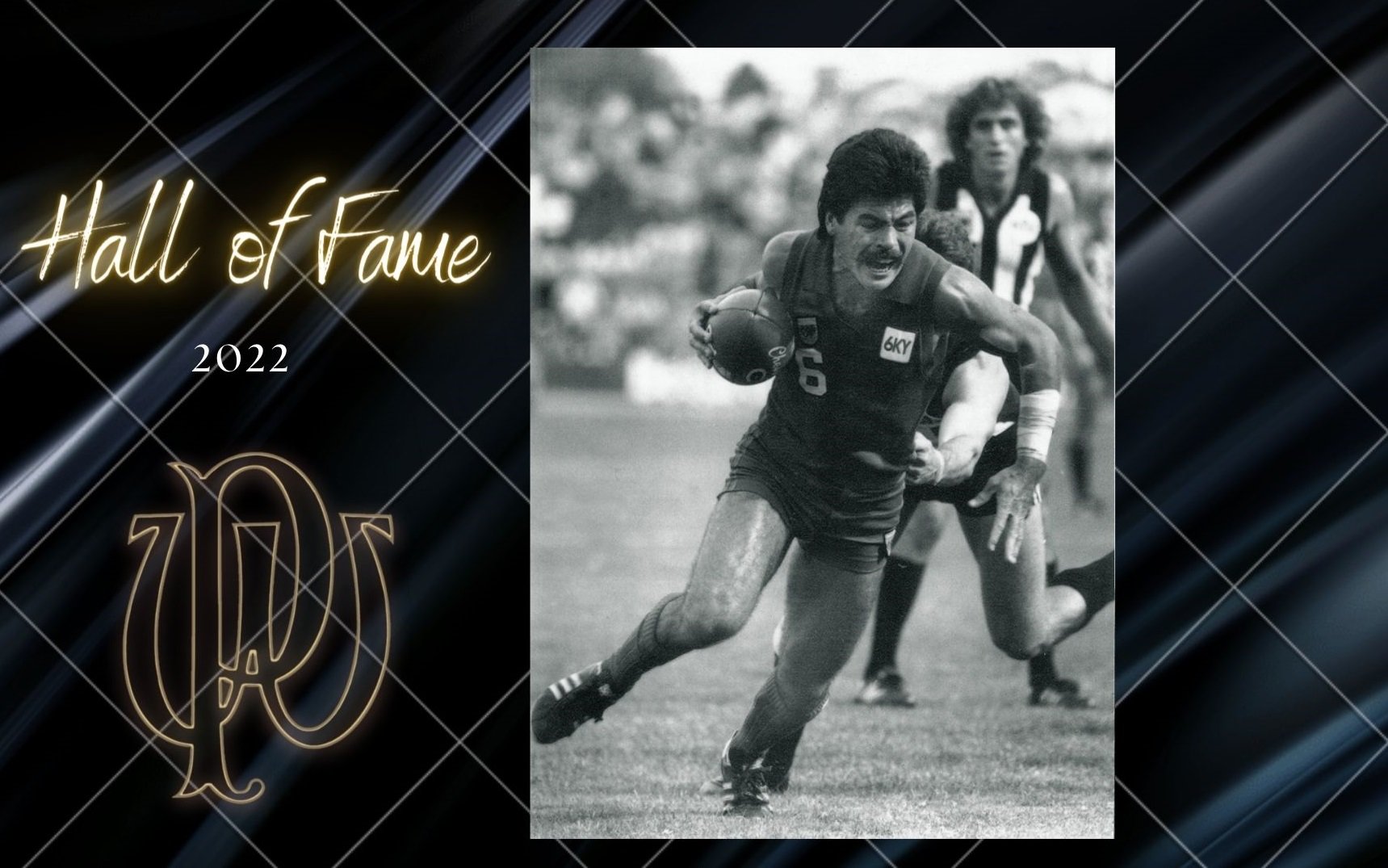
Les Fong
Les with his three brothers Graham, Stephen and Neale all loved football. They all played at Nollamara Junior Football Club and the 3 brothers all played for Nollamara Amateurs and Neale also with Trinity Aquinas. Les started his career as an eight-year-old with Nollamara Juniors in Under 12. Believe it or not but at one stage he was a ruckman, then Ruck Rover to eventually being a rover
He was recruited to West Perth in 1972 by Peter Steward via his future father in law’s letter as Les those days was not allowed to play on Sundays in which the 3rd & 4th and Under 18s competitions were played. His father in discussion with Len Roper and Ron Bewick agreed to play him only in the 2nds so he would not supposedly get hurt. Les as a 16-year-old, won the Seconds Best + Fairest medal in 72 where he played as a rover.
Les made his debut in the senior team in round 8 of the 1973 season against East Fremantle at the age of 16 ½. He became the youngest player to represent West Perth at league level at the time until Geoff Hendriks in 1975. He was emergency (21st Man) to the 1973 loosing Grand Final against Subiaco. Despite only playing a handful of 2nds games, he played well enough to take the seconds fairest and best award for the second time.
Les was nicknamed by Leon O’Dwyer as “Chop Sticks”. This name later became known as “Choppy” by teammates and supporters. Les was a strong ‘in and under’ player, always at the fall of the ball, always showing a strong desire to win the ball at all costs, with aggression and speed, the press nicknamed him ‘Captain Courageous’. Les was awarded the Breckler Scholarship in 1974 when he started University.
Les turned 19 thirteen days before the 1975 finals started. He gave his best performance of his short career in the second semi-final against Swan Districts. A feature of his game was his superb tackling. He tasted premiership glory in 1975 when West Perth defeated South Fremantle.
Les was elected club captain in 1980 taking over from Geoff “Bushy” Taylor. Les remained captain through to 1986 (7 years), making him the longest serving captain at West Perth and also in the history of the WAFL.
He won the club best and fairest in 1982 and 1983. Les finished his career in 1987 at the age of 31, he played 284 games, another season would have allowed him to reach the 300-game milestone.
After retiring from playing, he began coaching Trinity Aquinas in the Western Australian Amateur Football League for three years. Runner up in 1988. He then coached the Sunday Football League club Wanneroo to consecutive premierships in 1991 and 1992.
Les Fong is the first rover in West Perth’s official ‘Team of the Century’. Les Fong was inducted into the West Australian Football Hall of Fame in 2006.The Arena Joondalup gates were named after Les Fong and commissioned in 2001. A plaque was presented to Les from Phil Hanna the club President.
- WPFC 1973-1987
- 284 games
- 331 goals
- 1 state of origin games, 5 state games
- 60 career Sandover Medal votes
- Breckler Medal winner 1982, 1983
- WPFC captain 1980-1986
- WPFC premiership player 1975
- WPFC Team of the Century (rover)
- WPFC Life Member
- WA Football Hall of Fame member
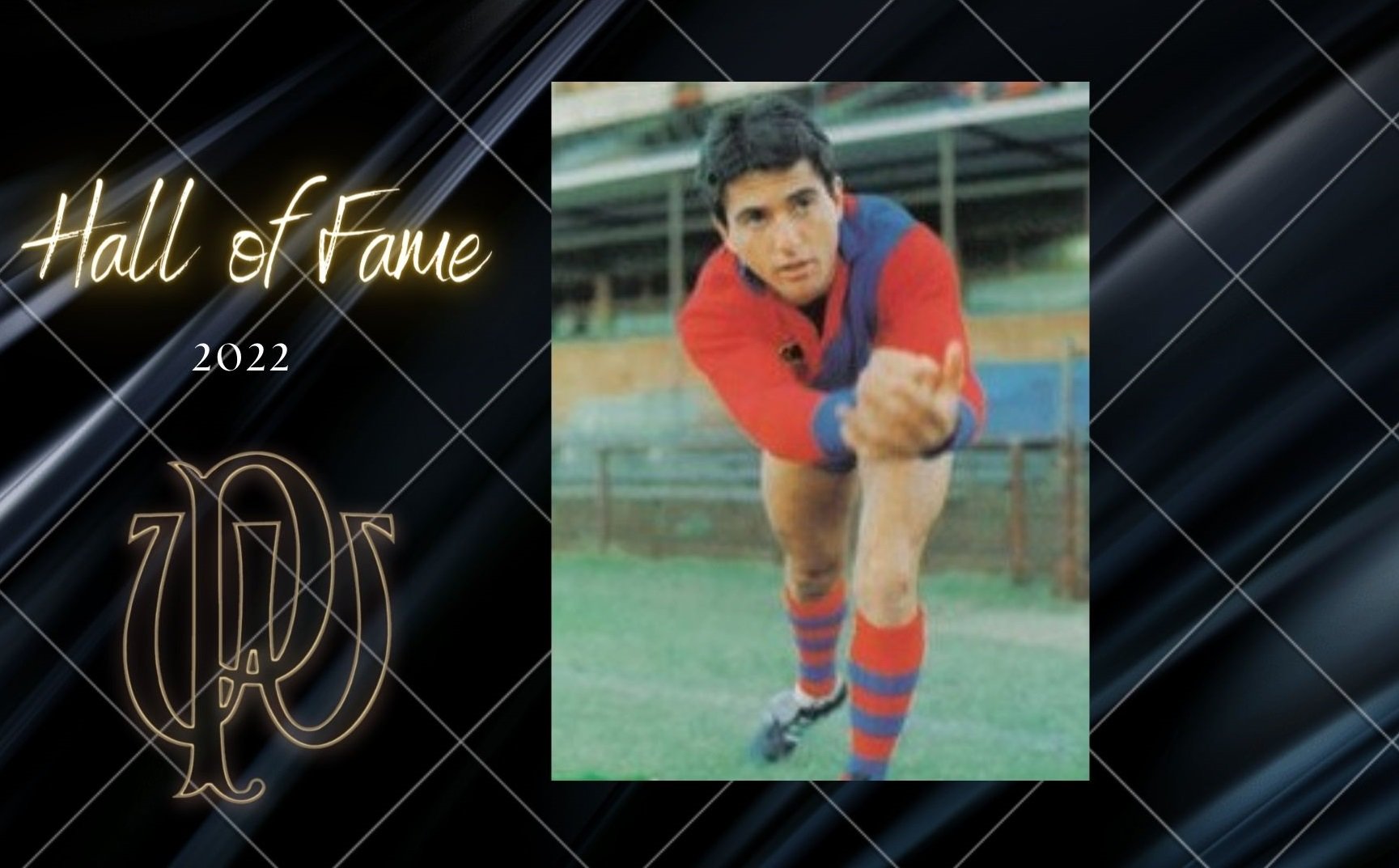
Peter Menaglio
Peter was always going to be a footballer, playing junior football at Osborne Park from 6 years of age, was coached by his father at 8 and 9 years old. He played football at Tuart Hill primary with Corry Bewick. Corry convinced him to play his junior football at Tuart Hill Football Club with Ron Bewick as the team manager. Ron arranged for Peter and Corry to play for West Perth colts in 1976.
Peter was picked to play his first senior game on 14th May, in Round 9, 1977 as a rover. He was given Leon O’Dwyer number 9 and was roving in Les Fong’s place, who was away playing state football for WA. That was Peter’s only game for the year.Peter became a regular player in 1978, under coach Percy Johnson. Getting picked to play on the wing was a huge compliment, competing with the champions of Alan Watling and Steven Smeath. Peter polled 5 Sandover votes in his first full year.
Peter’s game went to the next level under the coaching of Graeme Campbell. He polled the most Sandover votes from West Perth in 1979 with 11 votes. Peter had a standout year in 1981, winning the Breckler medal, winning on count back from Brian Adamson with 121 votes. He also polled very well in the Sandover with 12 votes. Peter was selected in the State side together with Ross Gibbs. He received an offer to play at Fitzroy in 1981 but declined.
Peter’s ball sense and anticipation always gave him time to deliver the ball downfield with position and poise. He was a gifted footballer with balance and silky skills. The West Perth supporters loved watching Peter play and in return he always gave a 100% effort, which always excited the supporters.
Peter won his second Breckler medal in 1984, just pipping Les Fong. Peter finished equal runner up in the Sandover Medal, to the three tied winners (Michael Mitchell, Peter Spencer, and Steve Malaxos). With the changing of coaches from John Wynne in 1986 to Bruce Monteath in 1987, Peter was made captain taking over from West Perth longest serving captain Les Fong.
Peter played State football in 1987, 1988, again in 1989, he won his third Breckler medal on a count back from Craig Nelson in 1989. Peter played his last game in 1989 at the age of 29, against Fremantle in a replay of the drawn 1st Semi Final against East Fremantle at Subiaco Oval. The 12 years of physical impact of bigger opponents on Peter’s body, helped make the decision to hang up his football boots. This, along with the ambition to move into Real Estate and retire from Primary Teaching, ended the career of one of West Perth most gifted footballers.
He played 236 games for the club between 1977 and 1989, winning club fairest and best in 1981, 1984 and 1989. In 2000 Menaglio was selected in West Perth’s Team of the Century.
After retirement, Peter served as a club selector for several years. Worked with Corry Bewick and David Palm in coaching the West Perth development squad during the 90’s.
- WPFC 1977-1989
- 236 games
- 184 goals
- 131 career Sandover Medal votes (best finish was 4th in 1984)
- Four state/state of origin games
- Breckler Medal winner 1981, 1984, 1989
- WPFC captain 1987-1989
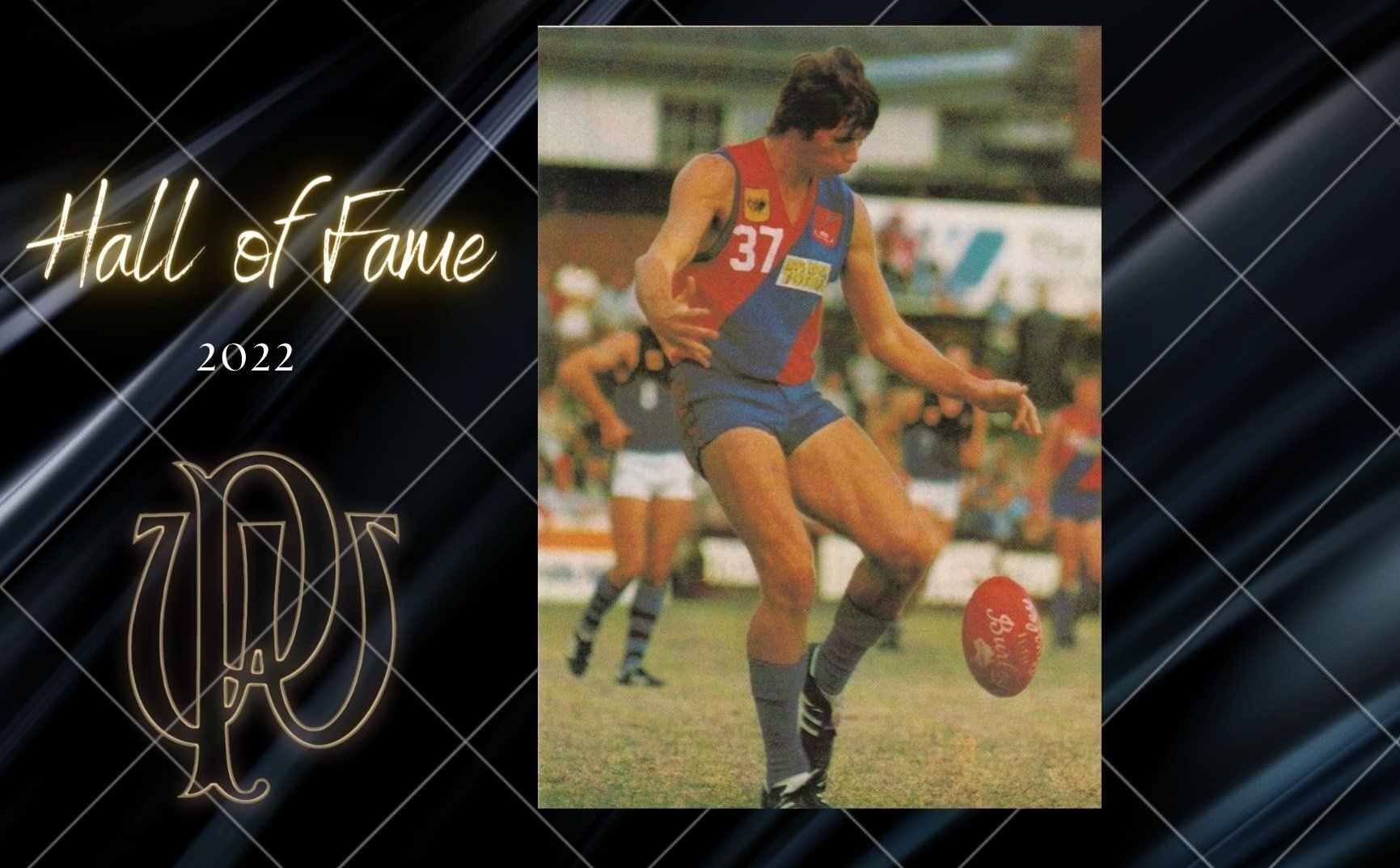
Paul Mifka
Paul Mifka was West Perth’s ‘Mr Fixit’.
Paul was the outstanding recruit of the year in 1984, also destined to be an original West Coast Eagle. He made his debut in 1984 as a wingman and played every game with the Falcons. He won several media awards as best first year player and finishing behind only Peter Menaglio and Les Fong in the Breckler Medal.
He showed glimpses of brilliance as a dangerous forward and finished his distinguished career as a dour and uncompromising defender.
Widely regarded as one of the WAFL’s most versatile players, the physically gifted boy from Balcatta used his physical strength and blistering speed off the mark to dominate his opponents all over the ground.
He joined West Coast in 1987, for their inaugural season but had to wait until the last home and away match to make his debut. The former Balcatta player gathered 14 disposals in a convincing win over St Kilda at Subiaco Oval and it would be his only appearance in the seniors. He was picked up by the Brisbane Bears in 1990 AFL draft but it wasn’t successful and he ended up back at West Perth.
In his 16 seasons and 283 games in the red and blue, Mifka was virtually unbeatable one-on-one.
Mifka had a unique ability to side-step his way out of trouble – particularly when he needed to swing onto his prodigious left boot – and when he launched into a trademark run down the wing at Leederville or Joondalup, the Falcons faithful greeted their cult-hero with chants of ‘Mifka, Mifka, Mifka’, from the stands.
Individually, the 1993 season was an outstanding one for Mifka. He polled a career-high 25 votes to finish fifth in the Sandover Medal, before more importantly, winning his one and only Breckler Medal a few weeks later.
Nothing summed up Mifka’s ability to play the swingman role than his extraordinary feats during the 1995 season, a famous one for the club.
In round 17 against Perth at Joondalup, the Falcons turned a 27-point quarter-time deficit into a 93-point victory. John Dimmer moved Paul Mifka from defence to centre half forward and the game changed, inspired by Mifka’s stunning 10-goal haul, kicking 10.4 in the last three quarters.
Then, just under two months later, he helped the club to an historic and drought-breaking premiership triumph. After Subiaco star Jason Heatley booted 10 majors of his own in a losing effort against West Perth in the second semi-final, realising the goalkicker’s threat, coach John Dimmer sent Mifka to the opposition goal square.
The rest is history. Heatley had no impact as the Falcons broke a 20-year premiership drought. It solidified Mifka’s status as a club great.
There was no more fitting way for Mifka to bid farewell to the Falcons faithful than another flag – this time in 1999 – as the veteran shrugged off an injury-plagued year to play a role in his team’s September success over the Fremantle-aligned South Fremantle.
- WPFC 1984 – 1999
- 283 games
- 136 goals
- WPFC 1984 – 1999
- 4 state/state of origin games
- Breckler Medal winner 1993
- WPFC premiership player 1995, 1999
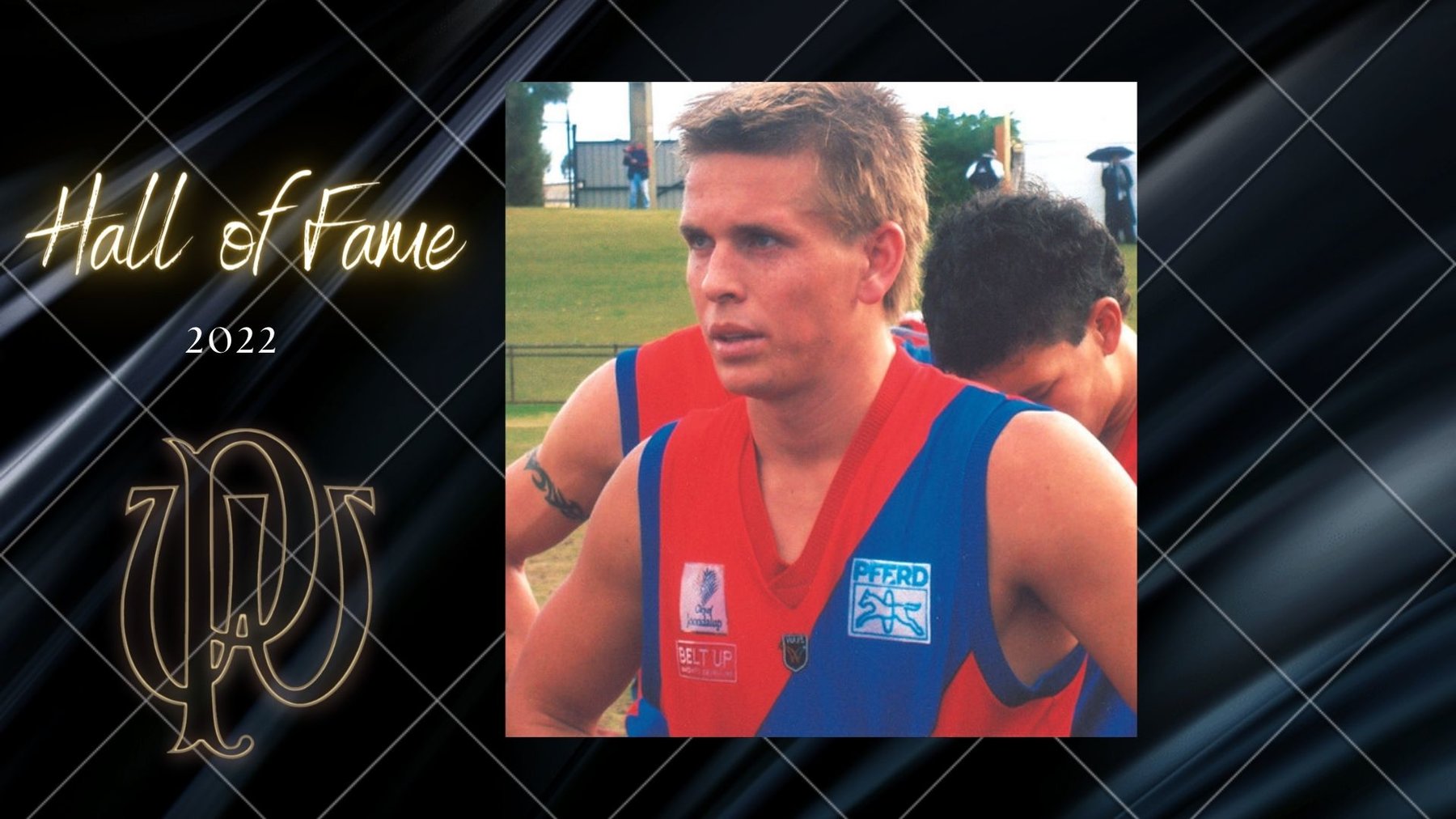
Mark LeCras
Mark LeCras, born 30th August 1986; thanks, his father Peter, and his older brother Brent for influencing his football career. Brent is five years older than Mark, who also played at West Perth.
Mark grew up in the small country town of Cervantes, the choice of sport was football only, which he loved together with his elder brother. He moved to Perth for high school and played junior football for both Cervantes and Whiteford’s.
Mark’s father Peter played for East Fremantle, Brent enrolled under the father son rule but did not get a game at East Fremantle, so he moved to West Perth.
Mark followed his brother and started playing colts with West Perth in 2003 and 2004. Gavin Bell and Neil Mildenhall coached Mark in the colts, his captain was Nathan van Berlo.
Mark played for Western Australia at the 2003 and 2004 Under-18 Championships, and was named in the 2004 Under-18 All-Australian team. He was named as a half-forward flank in the WAFL colts Team of the Year in both seasons. Mark was pick 37 for the WCE in the 2004 draft.
Darren Harris introduced 17 first year players to the West Perth league list in 2004, including Mark. Mark made his senior debut for West Perth against Claremont in round 20 of the 2004 season, and played two further games for the season, in rounds 21 and 23. Darren resigned after the 2005 season and accepted an assistant coaching position with the West Coast Eagles. Todd Curley was appointed the new coach for 2006 and 2007.
Mark started playing half forward at West Perth and then the role switched to three quarters midfield and one quarter at forward. This role really allowed him to play his best football.
“I loved West Perth as a kid and having that older brother influence of him being five years older coming through the pathway ahead of me, he really showed me what was possible. The club treated Brent very well. He played 143 games and played in the premiership team of 2003. I only have great memories of sitting in the grandstand, watching league football after playing colts and enjoying a very happy family environment, it was awesome.” Said Mark.
Mark had a sensational season in 2006 kicking over 50 goals, he had 35 possessions and kicked 7 goals against the Royals on 5th of August. He had 29 possessions and kicked 8 goals against the Swans on the 26th of August. The next week he was picked to play for the West Coast Eagles. He responded by kicking 5 goals. Mark career with West Perth was practically finished after this performance.
Mark recalls taking a big hanger on round 14, 2006 at Fremantle Oval in front of a couple of the West Coast coaches. He got picked to play for them in the two following weeks. It’s a memory he holds fondly.
When he wasn’t playing for the West Coast Eagles, he came back to West Perth. The way WPFC treated him was first class. They instilled him with so much confidence and allowed him to play certain roles that made him the best footballer he could be. He really flourished at the football club. He felt he played some of his best football in a West Perth jumper.
With regards to individual opponents, Mark recalled playing on Rowan Jones who was a West Coast teammate that dominated at WAFL level. Back then a lot of weeks you’d play against your West Coast teammates in the WAFL clubs. Because Mark came through the ranks, he had so much pride in the West Perth jumper that he embraced and thrived on beating the opposition if he knew them or not.
He enjoyed playing under all coaches as they all helped him get better in different ways.
Darren Harris’s philosophies around football game are hard to beat, whereas Todd Curley allowed Mark lots of freedom to develop his game.
Mark has made lifelong friends with Nathan van Berlo, Andrew Stryjk, Jason Salecic, Jack Darling and Quinten Lynch.
Mark only got to play one league game with his brother Brent. That was in round 11, 2008 against East Perth on Foundation Day at Leederville Oval. Coming back from injury Mark played half a game.
Mark recalled getting told off by the coach for kicking too much too his brother.
Mark played only one game for West Perth in 2008 season, but this was a special one. This was the last time Mark put on a West Perth jumper and is one of his fondest memories in football.
Mark played a season at Cervantes after he retired from WCE. He kicked 15 goals in one game, which was three short, of his brother’s record.
Mark married Emily Marshall in a private ceremony on 23 December 2011, with the reception held at Cottesloe Beach. They share two children.
Nowadays Mark devotes more to his family, raising three children.
Mark did a bit of coaching in preseason at Fremantle to help his good friends Justin and Troy Longmuir.
- WPFC 2004-2008
- 41 games
- 69 goals
- West Coast Eagles FC 2005-2018
- 219 games. 441 goals
- West Coast premiership player 2018
- 34 career Brownlow Medal votes
- All Australian 2010
- WCE Club Champion 2010
- WCE leading goalkicker 2009, 2010
- AFL Rising Star Nominees 2006, 2007
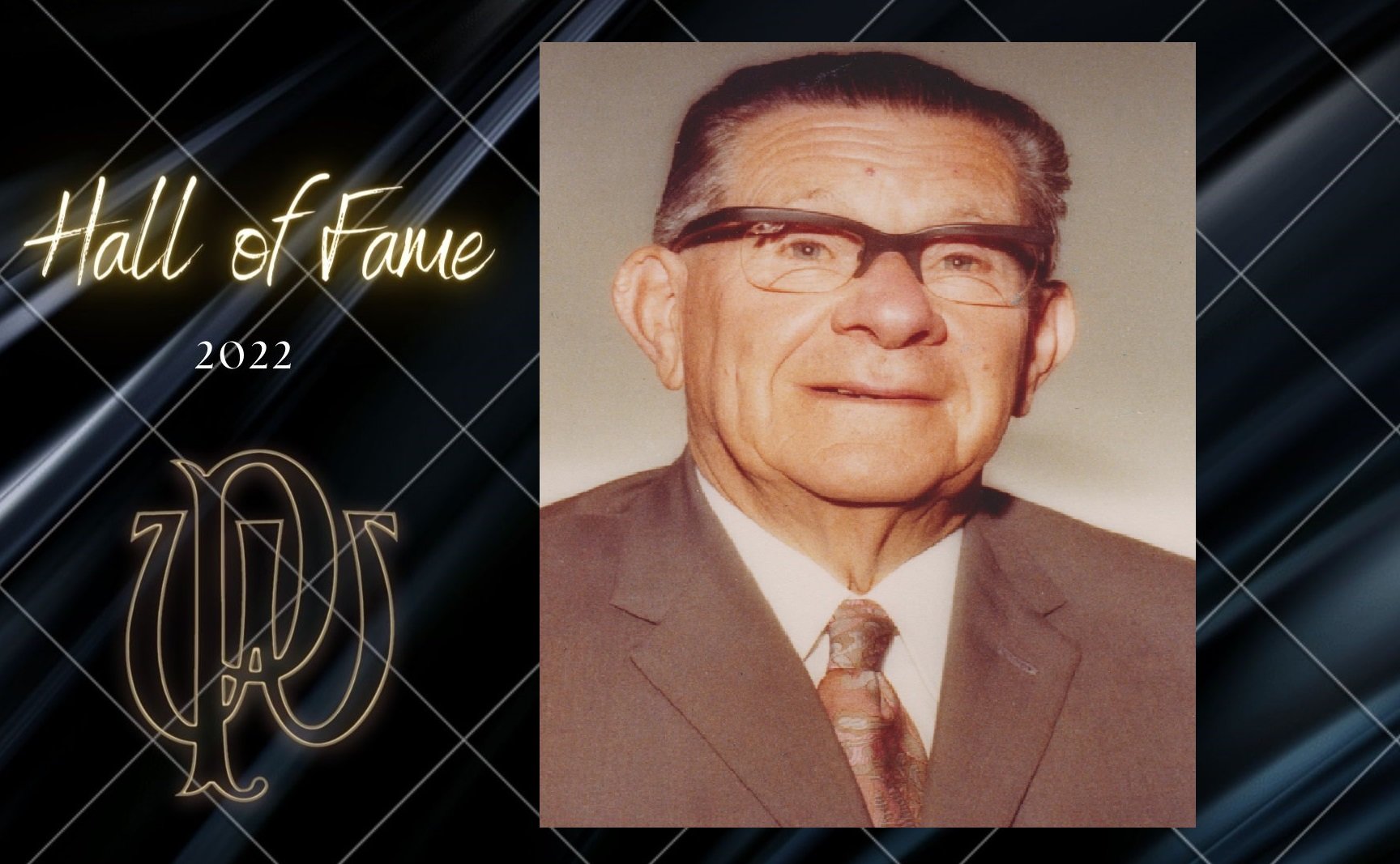
Alec Breckler
Alec Breckler first went to Leederville Oval at the age of ten and started barracking for the Cardinals. This started his love for West Perth football club, and he only had blue and red eyes – One eye blue and one eye red.
Alec lost his father at an early age and had to start his working career. His family lived in Mt Lawley, and he always walked to Leederville Oval, to see the Cardinals.
Alec with wife Hannah had two daughters. He had a brother Cecil who went to games too.
Alec always volunteered. He did a lot of philanthropic work for the Jewish community in particular the holocaust survivors from the war that migrated to Perth. The Breckler family were instrumental in raising money for various Jewish causes around the world.
Alec made sure he was not devoting too much time to the Jewish community, as he realised, he had a strong attachment to West Perth. He loved going to all West Perth football games and he felt he was in a position to help the club.
At 30 years of age, Alec became the President in 1930. West Perth had not won a premiership for 30 years. Alec set about bring success to the club, in 1931 he convinced the committee to recruit the champion Fitzroy and Victorian ruck man, Jack Cashman. The committee agreed and Alec secured the services of Jack, who was appointed Captain coach. West Perth went on and beat East Perth 18:9:117 to 11:8:74 in 1932 and thus breaking a 32-year premiership drought.
Alec then brought over Max Tetley from the eastern states along with a number of other footballers. There were no draft, and no monetary restrictions in these years. Alec would offer them a job in his company. West Perth went on to win three premierships in four years 1932, 1934 and 1935.
After Alec stepped down from President, he continued to be the club patron. The club named the best and fairest award after Alec Breckler in 1960. The early winners were Peter Medhurst, Joe Fanchi and then Mel Whinnen.
The club announced on the 19th of September 1967, the Breckler scholarship to assist in the education of young players, the inaugural winner was Laurie Scanlon.
Post retirement Alec continued to attend games. Players that stood out were Brian Foley, Mel Whinnen, Bill Dempsey, and John Vukman. He would go every week and sit in the president’s box with his granddaughters Debbie and Gayl. Debbie recalls being there with him. Every time he would buy her a Football Budget. Being female, they was not allowed in the men’s changeroom, but Alec would go down and get full team signatures of every single player on the day. Debbie wishes she kept all her editions.
Sadly, when Alec’s time at the club wound down as his wife Hannah became unwell. He found it a challenge to find time to go to the football. Hannah was incredibly supportive of Alec and the club. Often after a game the footballers would go back to the Breckler house for dinner and Hannah would put meals on.
The Breckler’s continue to go to West Perth games. Family members from three generations attended the 2022 WAFL Grand Final win by West Perth.
- Alec BRECKLER (administrator)
- WPFC president 1930 – 1935
- WPFC Life Member
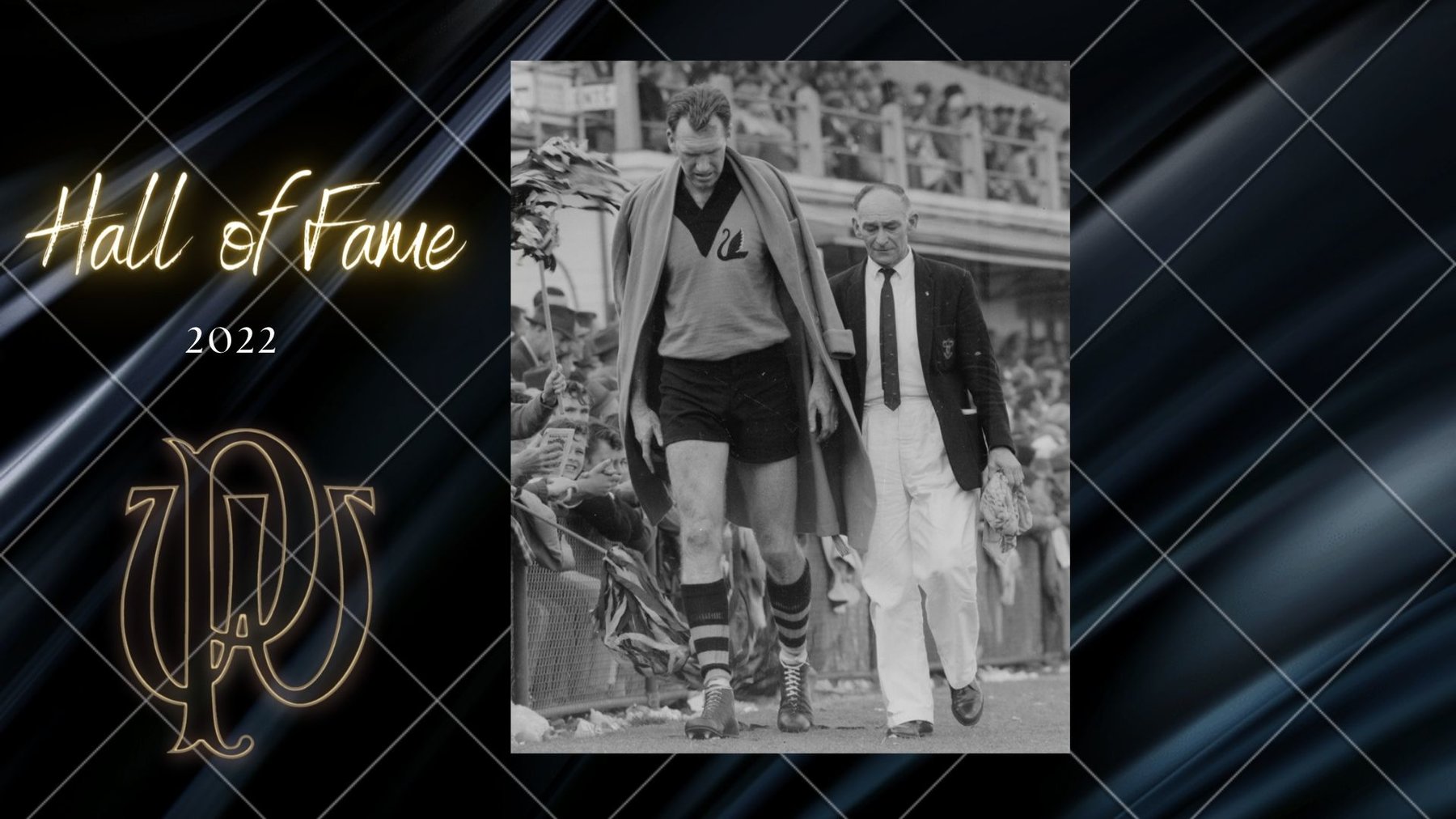
Roy Ennis
ROY ALLEN ENNIS, Born 12th December 1907, Passed away 10th September 1995, (Age 87)
Roy was one of five children (3 boys and 2 girls) born to Joseph Jordan Ennis and Caroline Ennis (nee Jenke).
He attended primary school at Osborne Park Primary School before entering the workforce as a Fitter and Turner with Rushton Bushell and Co., Elder St, West Perth. He worked there for a good many years.
He married Alma Mary Oakley, and they had three children Keith, Laurel, and Stan.
In his younger days he was a cyclist competing in many Amateur Competitions around the state. He finished 10th in the Northam Perth classic. After his cycling career ended, he then started to manage cyclists for several years. One of the most famous was Bill Oakley who won 11 State Titles from the pursuit, half mile, mile and 5-mile races.
Unfortunately, Bill was killed riding his cycle at an early age. Another cyclist Roy trained was George Moore a future Australian Champion. He was a both a cyclist and a trainer at WPFC.
Roy was the first secretary for the Mount Hawthorn-Metropolitan Junior Football Club. It was here that he became interested in the training side of football. As there was no one at his Football Club with training skills, he went to West Perth Football Club, to learn these skills which then served him well for many years.
Roy then went to West Perth Football Club as a trainer in 1932. He stayed at the club for 55 years and became the Head Trainer 1952 after Alan Lyons retired as Head Trainer due to work commitments. Roy remained as Head Trainer at WPFC until he retired in 1987. He offered to retire in 1985 but the Club enticed him back and he completed a further 2 years.
After retiring from work Roy also became involved at the WACA with their training requirements. He did this for about 15 years helping players from WA, interstate, and overseas players. He has collected memorabilia from many overseas players that he assisted during these years. He also travelled interstate with both West Perth Football and Westralian Australian Cricket teams.
Some football players he helped over the years where Stan “Pops” Heal and his sons Graham and Laurie, Johnny Loughridge and his son Greg and Brian Foley and his son Dan. He classed Fred Buttsworth as the most gifted player to represent the Club.
After a lifetime of training other athletes and ensuring they recovered as quickly as possible, Roy finally retired from his Cricket training responsibilities in March 1985 and Football training responsibilities at the end of the 1987 football season.
A tribute dinner was held on Monday, March 25th, 1985, to recognise Roy’s long and wonderful service to Cycling, Cricket and Football.
The WPFC Reserves best, and fairest player is presented the Roy Ennis Memorial Medal each year.
Roy Ennis
- WPFC trainer 1932-1987 (head trainer 1950-1987)